Search Result
Results for "
androgen receptor (AR)
" in MedChemExpress (MCE) Product Catalog:
15
Isotope-Labeled Compounds
| Cat. No. |
Product Name |
Target |
Research Areas |
Chemical Structure |
-
- HY-120018
-
|
|
Androgen Receptor
|
Cancer
|
|
VPC-13566, a BF3-specific small molecule, is an androgen receptor (AR) inhibitor. VPC-13566 is effective in inhibiting AR transcriptional activity in vitro as well as the growth of AR-dependent PCa cell lines. VPC-13566 can be used as a chemical probe to help identify unknown AR partners.VPC-13566 can be used for the research of cancer.
|
-
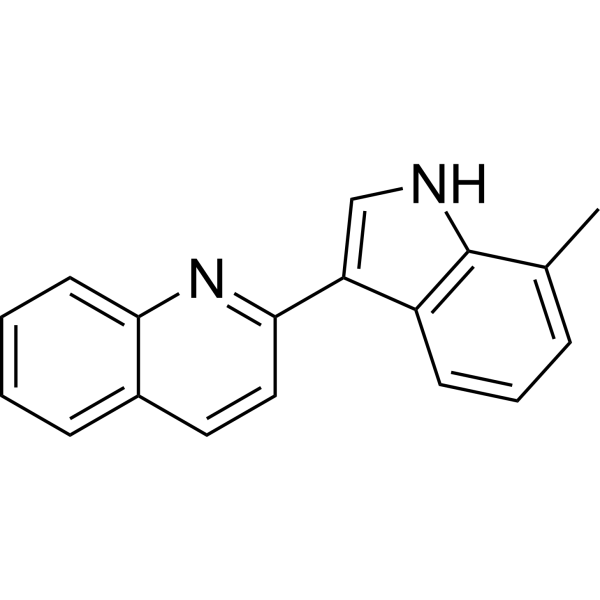
-
- HY-149862
-
|
|
PROTACs
Androgen Receptor
|
Cancer
|
|
ARD-2051 is a potent and orally active androgen receptor (AR) proteolysis-targeting chimera degrader. ARD-2051 achieves DC50 values of 0.6 nM for AR protein degradation in both the LNCaP and VCaP prostate cancer cell lines. ARD-2051 can be used for the research of prostate cancer .
|
-
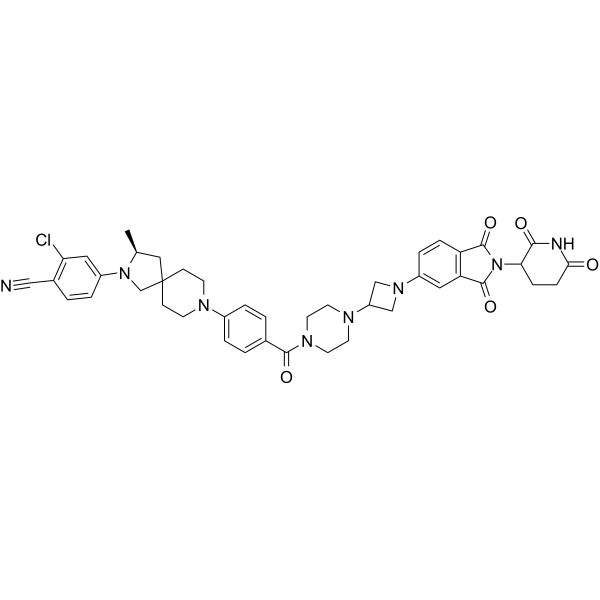
-
- HY-12111
-
-
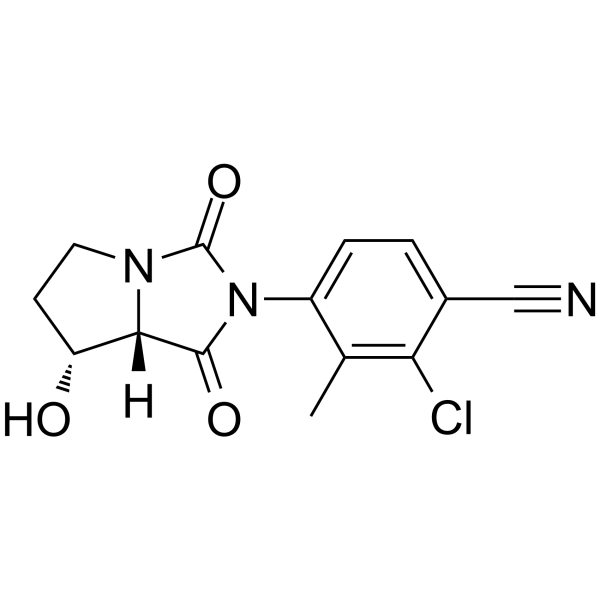
-
- HY-103246
-
|
|
Androgen Receptor
|
Cancer
|
|
TFM-4AS-1 is a selective androgen receptor modulator (SARM). TFM-4AS-1 is a potent androgen receptor (AR) ligand with an IC50 of 38 nm. TFM-4AS-1 is also a gene-selective agonist .
|
-
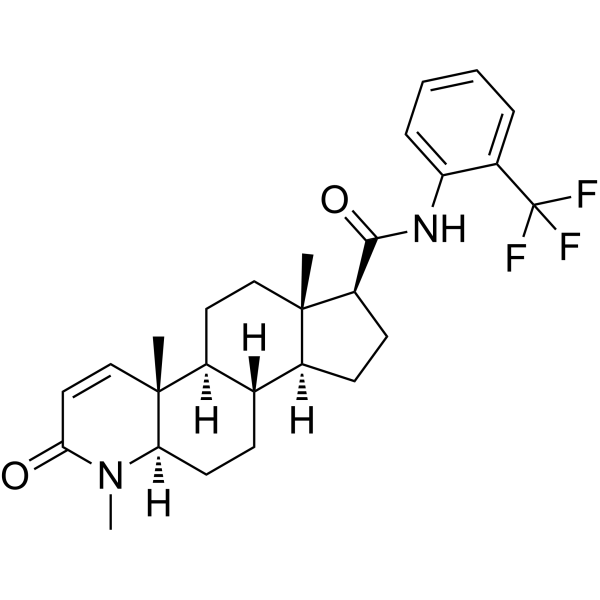
-
- HY-146027
-
|
|
Androgen Receptor
|
Cancer
|
|
Androgen receptor antagonist 4 (Compound AT2) is an androgen receptor (AR) antagonist with an IC50 of 0.15 μM. Androgen receptor antagonist 4 efficiently antagonizes AR transcriptional activity, suppresses downstream target gene of AR, and blocks the DHT-induced AR nuclear translocation. Androgen receptor antagonist 4 shows anticancer activities .
|
-
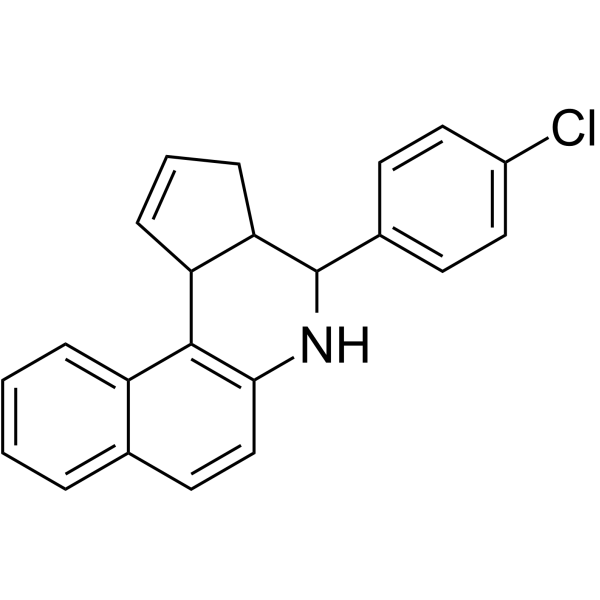
-
- HY-146494
-
|
|
Androgen Receptor
|
Cancer
|
|
Androgen receptor antagonist 5 (compound 42f) is a potent androgen receptor (AR) antagonist with an IC50 value of 6.17 μM. Androgen receptor antagonist 5 can effectively impair AR nuclear translocation, reducing the levels of nuclear AR, and disrupts AR-mediated gene regulation. Androgen receptor antagonist 5 has antiproliferative activity against LNCaP and exhibits antitumor activity in LNCaP xenograft tumor mice model. Androgen receptor antagonist 5 can be used for researching prostate cancer .
|
-
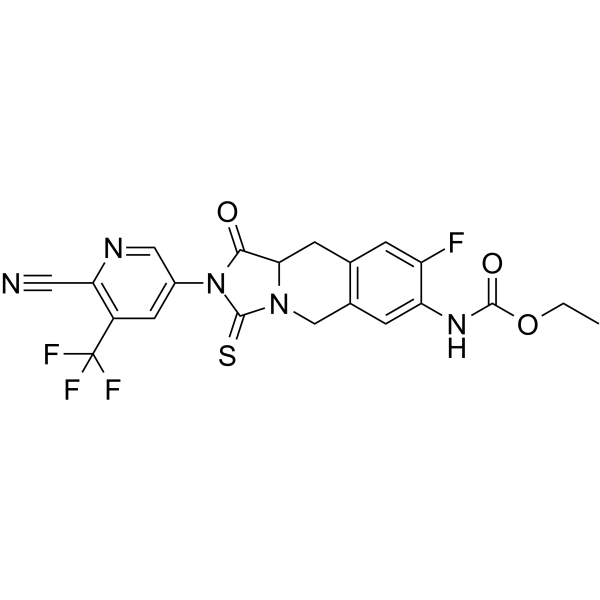
-
- HY-130992
-
|
|
Androgen Receptor
Ligands for Target Protein for PROTAC
|
Cancer
|
|
Androgen receptor antagonist 1 is an orally available full androgen receptor (AR) antagonist with an IC50 of 59 nM . Androgen receptor antagonist 1 (Compound 6) can be used in the synthesis of PROTAC AR degraders, which results 24% and 47 % AR protein degradation in LNCaP cells at 1 μM and 10 μM, respectively .
|
-
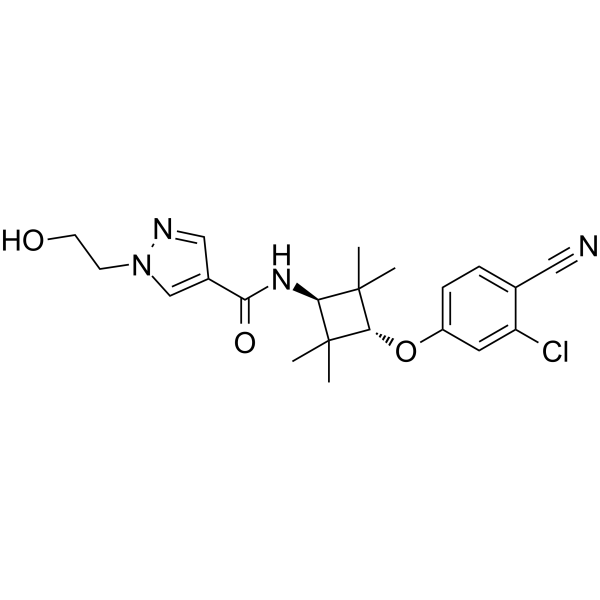
-
- HY-146026
-
|
|
Androgen Receptor
|
Cancer
|
|
Androgen receptor antagonist 3 (Compound C18) is an androgen receptor (AR) antagonist with an IC50 of 2.4 μM. Androgen receptor antagonist 3 shows anticancer activities .
|
-
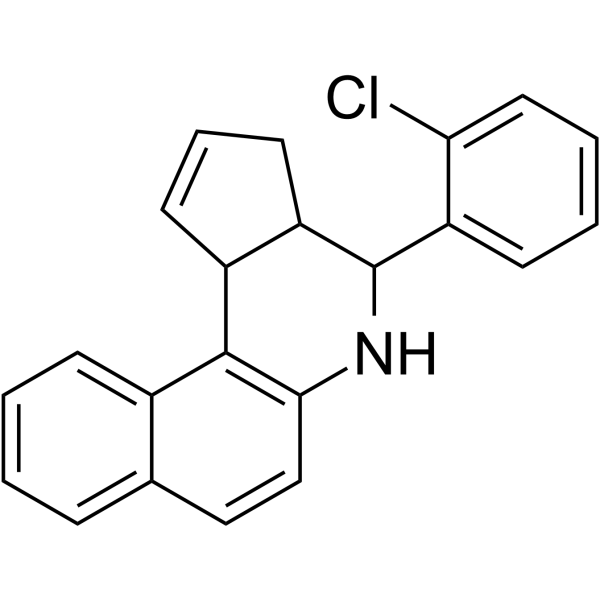
-
- HY-152524
-
|
|
Androgen Receptor
|
Cancer
|
|
Androgen receptor antagonist 7 is an effective androgen receptor (AR) antagonist with an IC50 value of 1.18 µM. Androgen receptor antagonist 7 has biological activity in vitro and inhibits the expression of AR target in a time and dose dependent manner with an GI50 value of 7.9 µM .
|
-
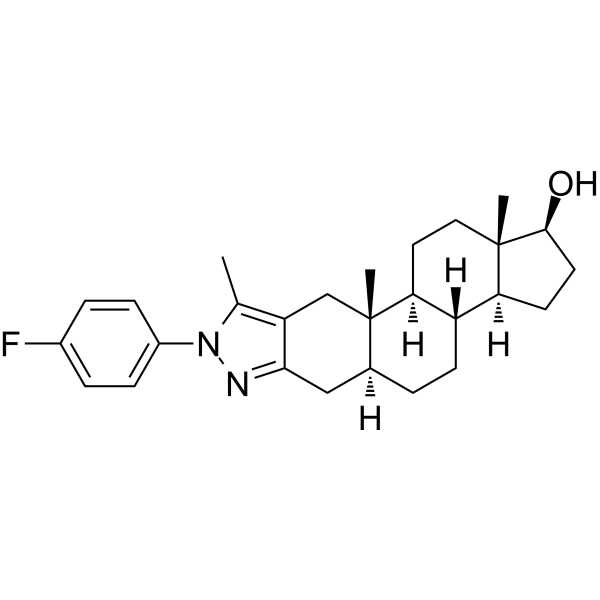
-
- HY-131953
-
|
|
Androgen Receptor
|
Cancer
|
|
Androgen receptor-IN-3 (Compound 22) is an androgen receptor inhibitor. Androgen receptor-IN-3 inhibits AR-driven transcriptional activity in LNCaP cells, with an IC50 of 5.04 μM .
|
-

-
- HY-160692
-
|
|
Androgen Receptor
|
Others
|
|
AR antagonist 7 (86) is an androgen receptor (AR) antagonist that can be used in the research of hair loss .
|
-
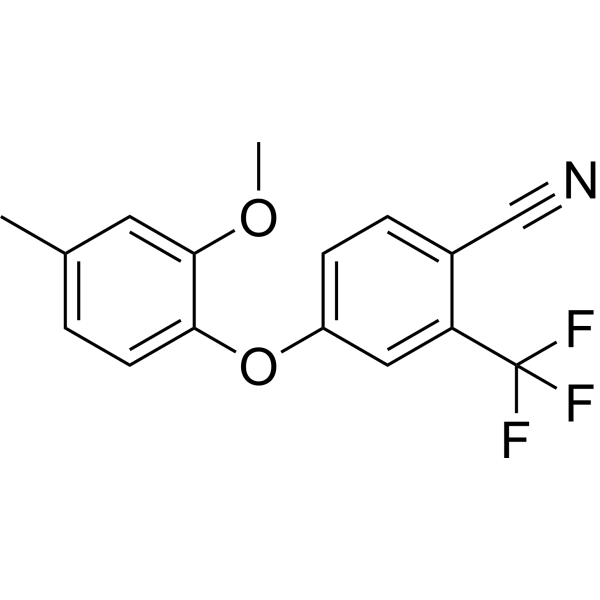
-
- HY-16060
-
|
ARN-509
|
Androgen Receptor
|
Cancer
|
|
Apalutamide (ARN-509) is a potent and competitive androgen receptor (AR) antagonist, binding AR with an IC50 of 16 nM .
|
-
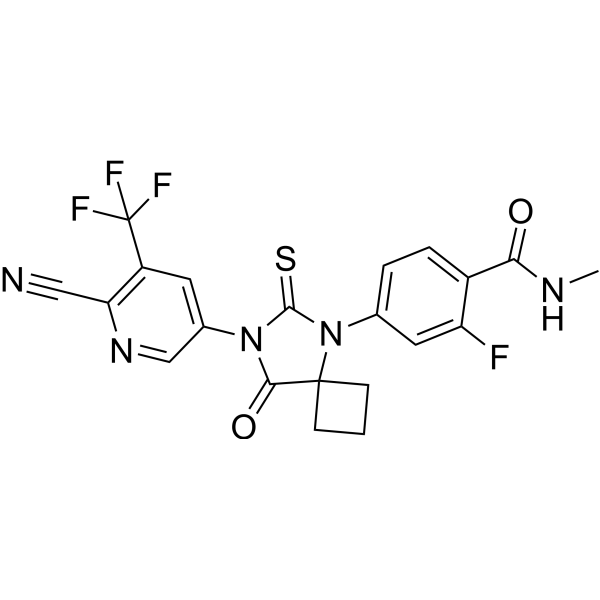
-
- HY-117669
-
|
|
Androgen Receptor
|
Cancer
|
|
VPC-14228 is a potent androgen receptor DNA binding domain (AR-DBD) inhibitor that interferes with the interaction of AR with androgen response elements and effectively blocks AR transcriptional activity. VPC-14228 can be used in prostate cancer research .
|
-
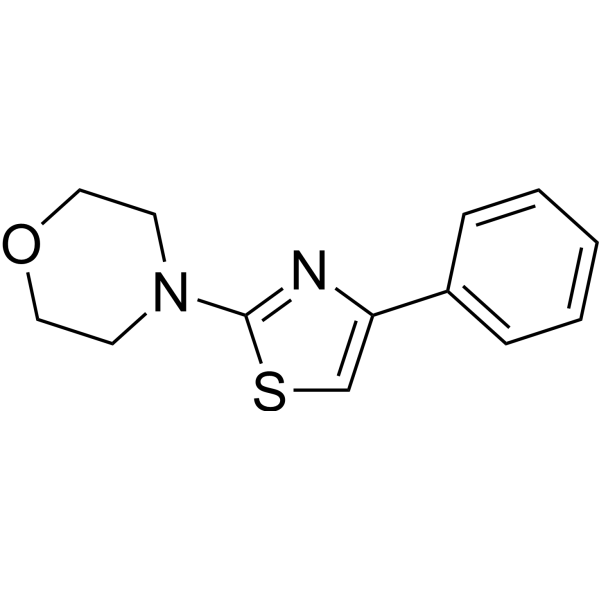
-
- HY-112895
-
UT-155
2 Publications Verification
|
Androgen Receptor
|
Cancer
|
|
UT-155 is a selective and potent androgen receptor (AR) antagonist, with a Ki of 267 nM for UT-155 binding to AR-LBD.
|
-
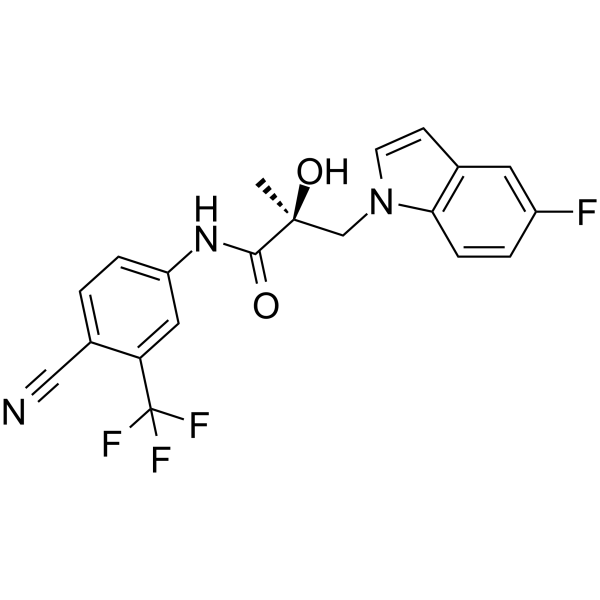
-
- HY-136596
-
|
|
Drug Metabolite
|
Cancer
|
|
Apalutamide-COOH is a metabolite of Apalutamide. Apalutamide is a potent and competitive androgen receptor (AR) antagonist, binding AR with an IC50 of 16 nM .
|
-
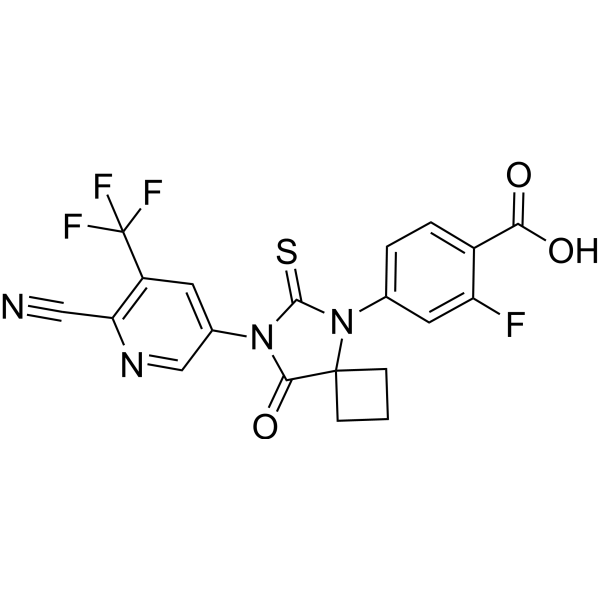
-
- HY-163641
-
|
|
Androgen Receptor
|
Cancer
|
|
AR Degrader-1 is an androgen receptor (AR) monovalent degrader. AR Degrader-1 degrades AR without obvious cytotoxicity in LNCaP prostate cancer cells .
|
-

-
- HY-15758
-
-
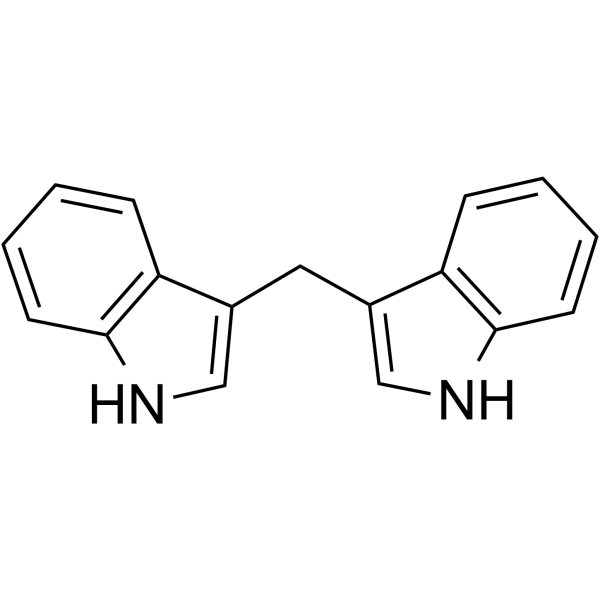
-
- HY-142923
-
|
|
Androgen Receptor
|
Cancer
|
|
AR antagonist 2 (compound 58) is a potent androgen receptor (AR) inhibitor with an IC50 of 0.95 μM. AR antagonist 2 has the potential for cancer research .
|
-
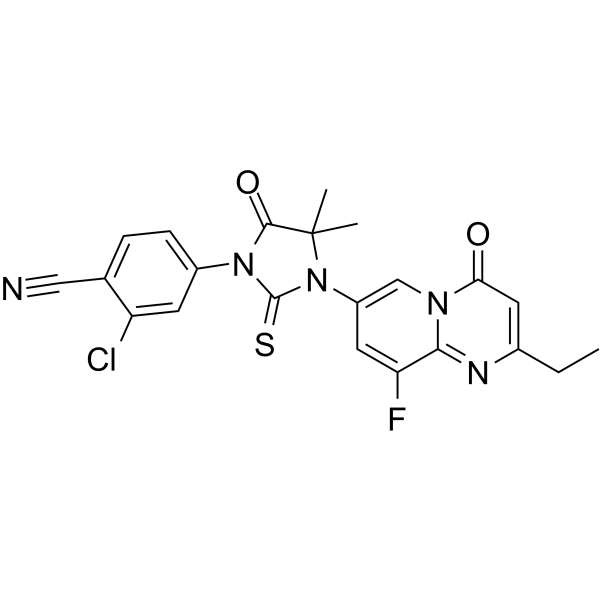
-
- HY-135732
-
|
|
Androgen Receptor
|
Cancer
|
|
SK33, a trifluoromethylated enobosarm analog, is a potent, and tissue selective anti-androgen. SK33reduces androgen receptor (AR) transcriptional activity .
|
-
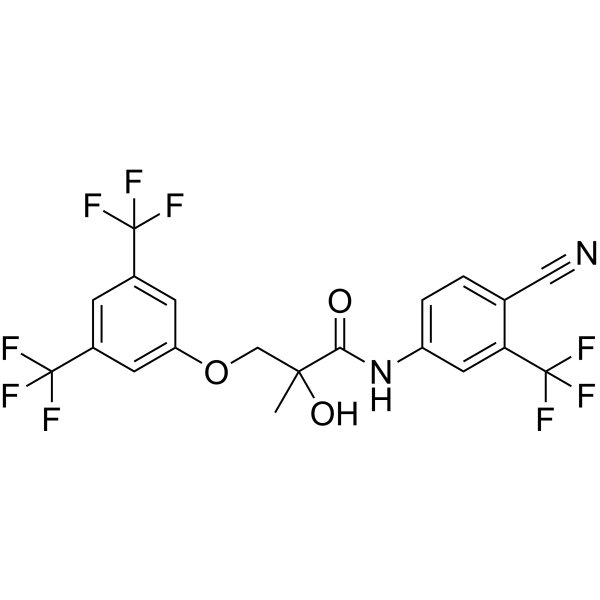
-
- HY-16079
-
AZD3514
2 Publications Verification
|
Androgen Receptor
|
Cancer
|
|
AZD3514 is an orally activie and selective androgen receptor (AR) inhibitor. AZD3514 androgen-dependently and -independently inhibits AR signal. AZD351 down-regulates nuclear AR levels in human LNCaP prostate cancer cells in the absence of androgen with an pIC50 value of 5.75. AZD3514 can be used for the research of prostate cancer .
|
-
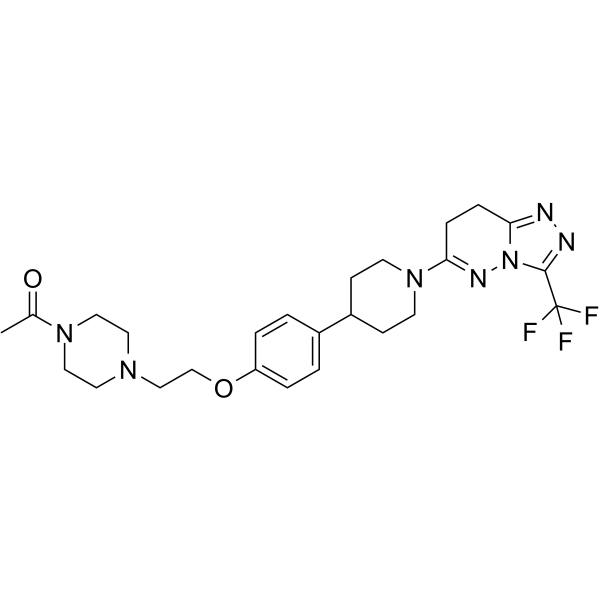
-
- HY-163485
-
|
|
Androgen Receptor
|
Endocrinology
|
|
AR antagonist 8 (compound 16) is a potent Lupeol-inspired androgen receptor (AR) antagonist with an IC50 of 0.76 μM. AR antagonist 8 is a uniquely substituted unnatural entestrane .
|
-
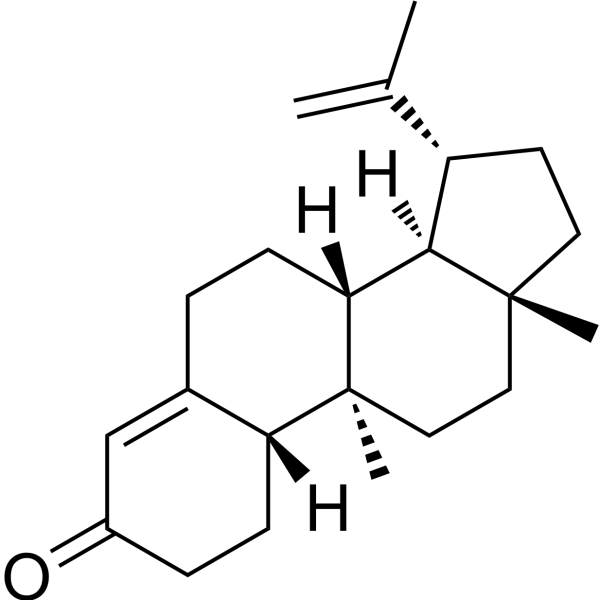
-
- HY-151266
-
|
|
Androgen Receptor
|
Cancer
|
|
AR antagonist 4 (Compound 67-b) is an orally active androgen receptor (AR) antagonist with an IC50 of 246.6 nM against wt-AR, and is also an AR degrader with a DC50 of 2.84 μM .
|
-
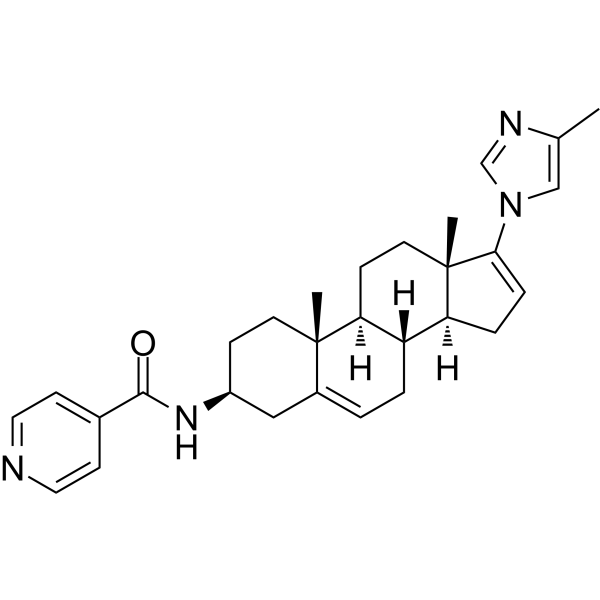
-
- HY-105122
-
|
WIN 49596
|
Androgen Receptor
|
Endocrinology
Cancer
|
|
Zanoterone is an orally active antagonist of the androgen receptor (AR) with a Ki of 2.2 μM. Zanoterone blocks the binding of androgens such as testosterone and dihydrotestosterone (DHT), inhibiting the androgen signaling pathway, thereby reducing androgen-dependent prostate hyperplasia and prostate cancer growth .
|
-

-
- HY-123310
-
|
|
Androgen Receptor
|
Cancer
|
|
JNJ-26146900 is a potent and orally active androgen receptor antagonist with a Ki value of 400nM for rat AR. JNJ-26146900 is a nonsteroidal androgen receptor (AR) ligand. JNJ-26146900 reduces prostate tumor size and prevents bone loss. JNJ-26146900 can be used in research of cancer .
|
-
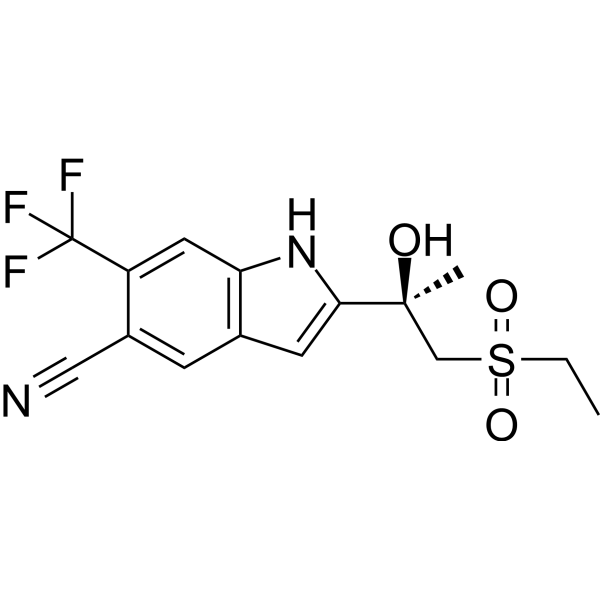
-
- HY-11027
-
-
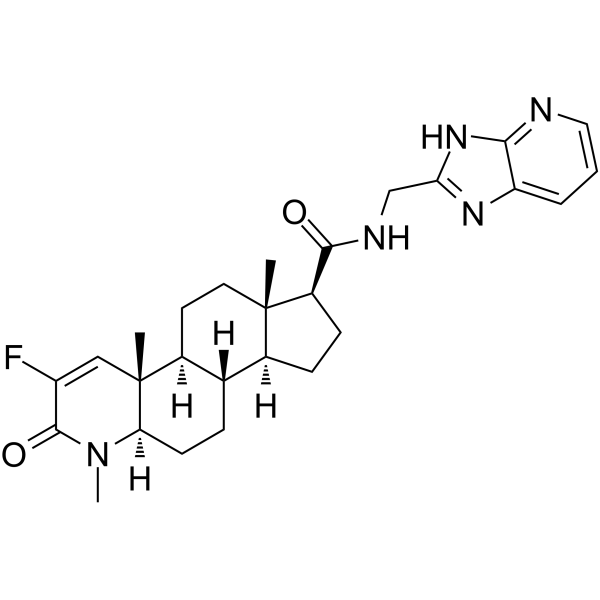
-
- HY-16060S
-
|
ARN-509-d4
|
Androgen Receptor
|
Cancer
|
|
Apalutamide-d4 is a deuterium labeled Apalutamide. Apalutamide is a potent and competitive androgen receptor (AR) antagonist, binding AR with an IC50 of 16 nM[1].
|
-
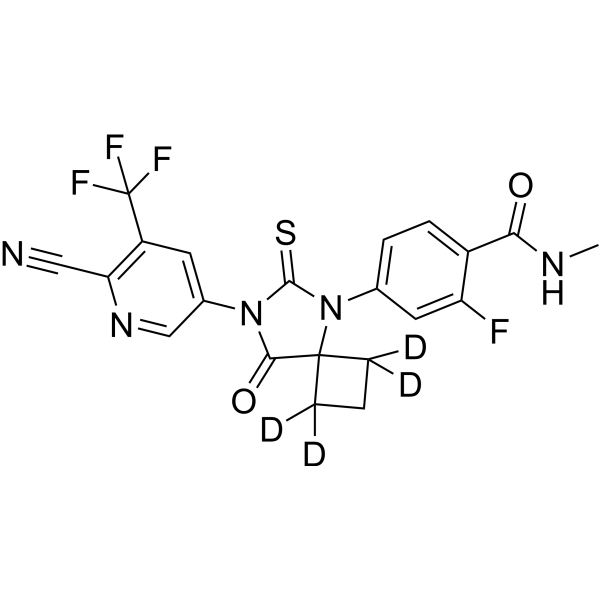
-
- HY-160680
-
|
|
Androgen Receptor
|
Endocrinology
|
|
AR antagonist 6 (compound 6i) is a diphenyl ether androgen receptor (AR) antagonist that binds AR at a concentration of 120 nM. AR antagonist 6 exhibits low toxicity and in vitro activity against the golden Syrian hamster ear model. .
|
-
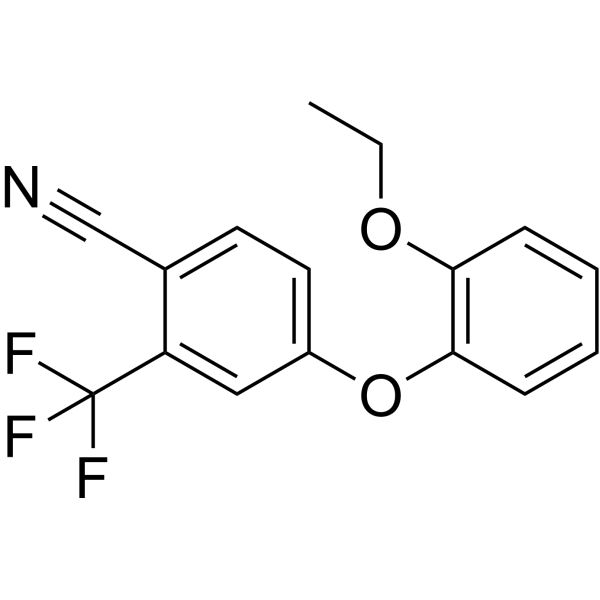
-
- HY-143535
-
|
|
Androgen Receptor
|
Cancer
|
|
HG122 promotes androgen receptor (AR) degradation through the proteasome pathway inhibiting the castration-resistant prostate cancer.
|
-
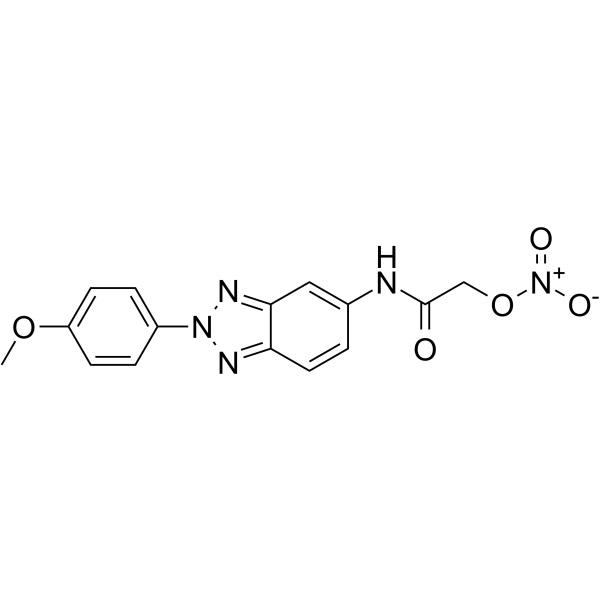
-
- HY-157455
-
|
|
Androgen Receptor
|
Cancer
|
|
AR antagonist 5 (compound 30a) is a selective androgen receptor (AR) antagonist with an IC50 value of 134.8 nM. AR antagonist 5 has favorable pharmacokinetic properties and shows a high skin exposure and low plasma exposure [1.
|
-
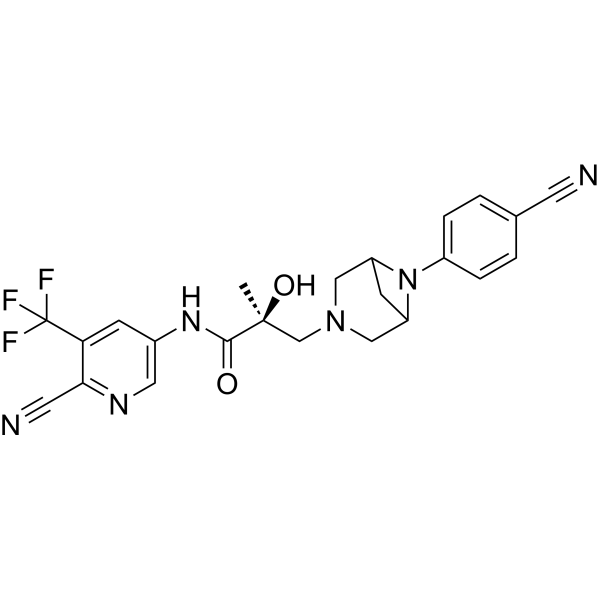
-
- HY-114402
-
|
|
Androgen Receptor
PROTACs
|
Cancer
|
|
ARD-69 (compound 34) is a potent PROTAC androgen receptor degrader. ARD-69 induces degradation of androgen receptor (AR) protein in AR-positive prostate cancer cell lines. ARD-69 suppresses AR-regulated gene expression . ARD-69 is a click chemistry reagent, it contains an Alkyne group and can undergo copper-catalyzed azide-alkyne cycloaddition (CuAAc) with molecules containing Azide groups.
|
-
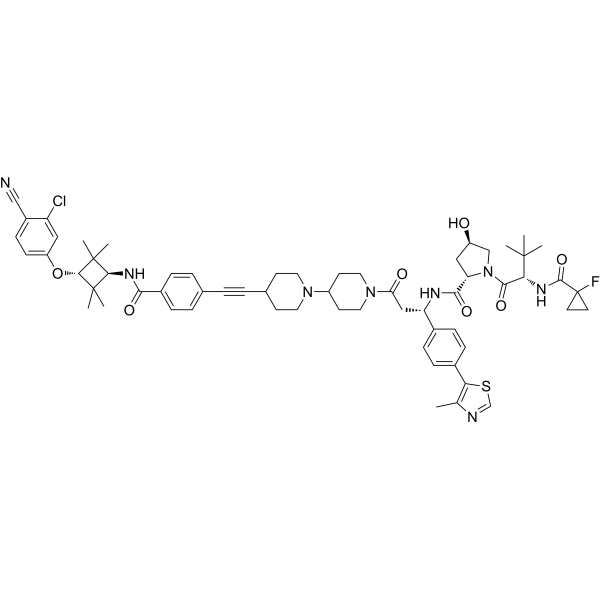
-
- HY-138641
-
|
ARV-110
|
Androgen Receptor
|
Cancer
|
|
Bavdegalutamide (ARV-110) is an orally active, specific androgen receptor (AR) PROTAC degrader. Bavdegalutamide promotes ubiquitination and degradation of AR. Bavdegalutamide can be used for the research of prostate cancer .
|
-
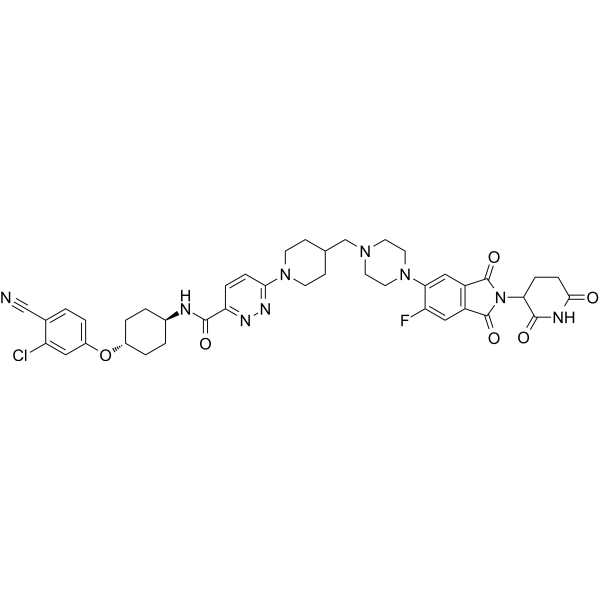
-
- HY-14249
-
|
|
Androgen Receptor
Autophagy
|
Cancer
|
|
Bicalutamide is an orally active non-steroidal androgen receptor (AR) antagonist. Bicalutamide can be used for the research of prostate cancer .
|
-
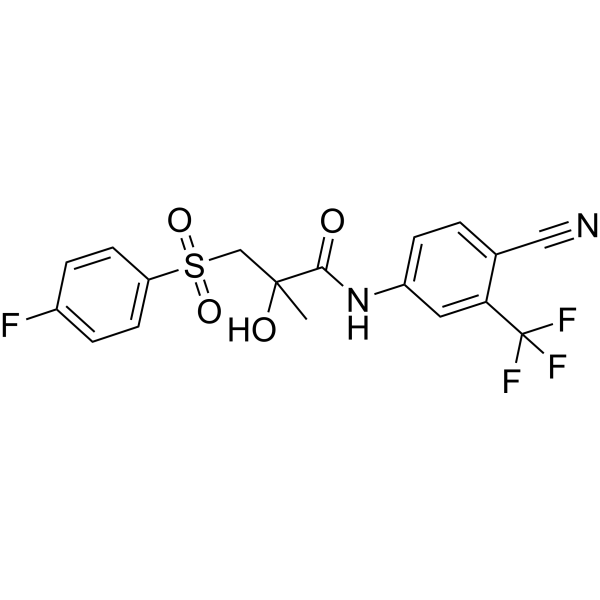
-
- HY-70002B
-
|
MDV3100 carboxylic acid
|
Drug Metabolite
|
Cancer
|
|
Enzalutamide carboxylic acid (MDV3100 carboxylic acid) is an inactive metabolite of Enzalutamide (MDV3100). Enzalutamide is an androgen receptor (AR) antagonist .
|
-
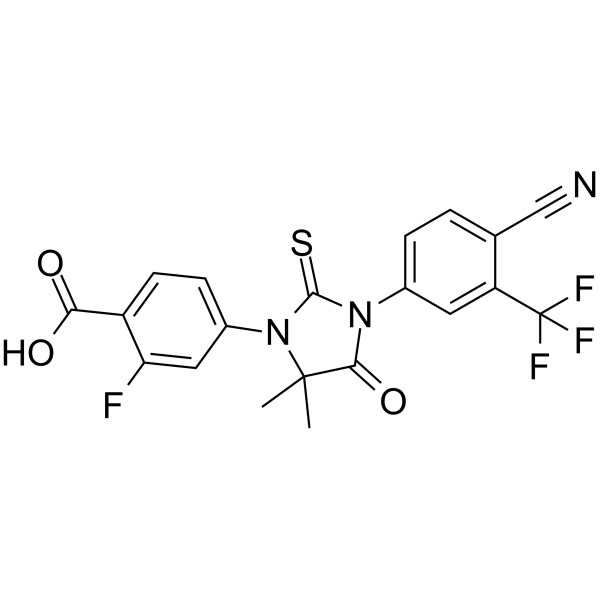
-
- HY-162241
-
|
|
PROTACs
|
Others
|
|
SJH1-62B is a proteolysis targeting chimera (PROTAC) that can target the androgen receptor (AR) .
|
-
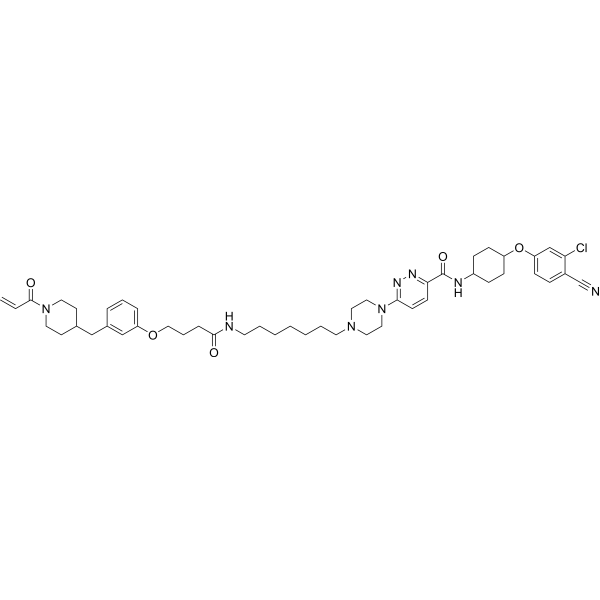
-
- HY-N1943
-
|
Δ13-Dehydrochaparrinone
|
Androgen Receptor
|
Inflammation/Immunology
Cancer
|
|
Ailanthone (Δ13-Dehydrochaparrinone) is a potent inhibitor of both full-length androgen receptor (AR) (IC50=69 nM) and constitutively active truncated AR splice variants (AR1-651 IC50=309 nM).
|
-
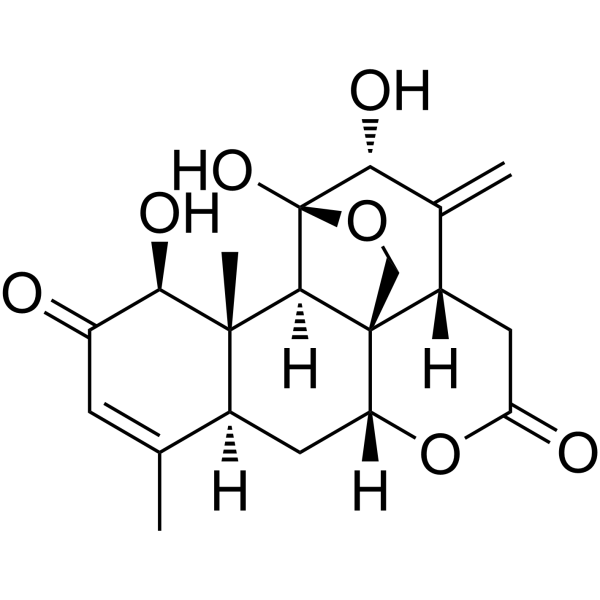
-
- HY-N9917
-
|
6′-O-Galloylalbiflorin
|
Androgen Receptor
|
Endocrinology
Cancer
|
|
Galloylalbiflorin (6′-O-Galloylalbiflorin) is an androgen receptor (AR) antagonist (IC50=53.3 μM) and can be found in the roots of Paeonia lactiflora. Galloylalbiflorin shows anti-androgens activity .
|
-
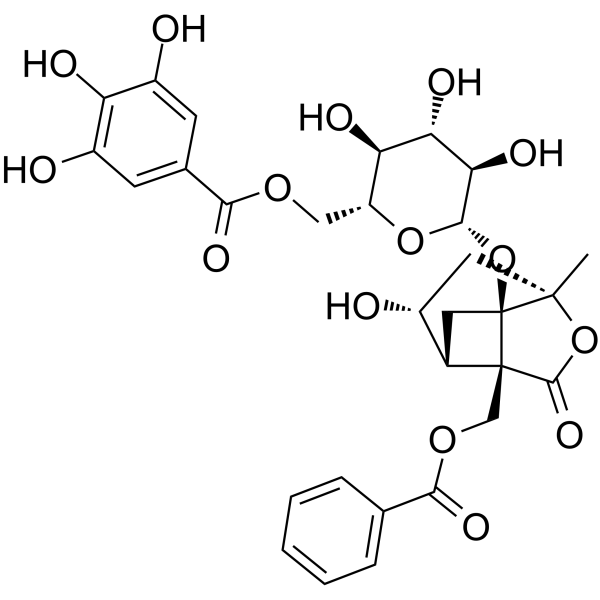
-
- HY-16060S3
-
|
ARN-509-d7
|
Androgen Receptor
Isotope-Labeled Compounds
|
Cancer
|
|
Apalutamide-d7 is deuterated labeled Apalutamide (HY-16060). Apalutamide (ARN-509) is a potent and competitive androgen receptor (AR) antagonist, binding AR with an IC50 of 16 nM .
|
-
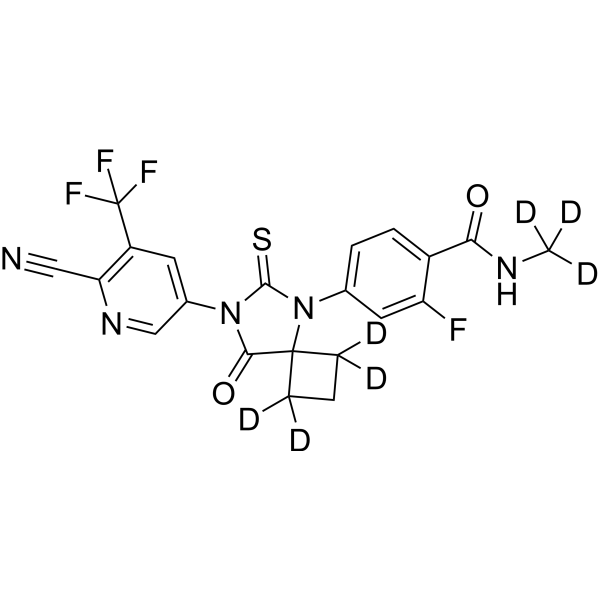
-
- HY-16060R
-
|
|
Androgen Receptor
|
Cancer
|
|
Apalutamide (Standard) is the analytical standard of Apalutamide. This product is intended for research and analytical applications. Apalutamide (ARN-509) is a potent and competitive androgen receptor (AR) antagonist, binding AR with an IC50 of 16 nM .
|
-

-
- HY-70002
-
Enzalutamide
Maximum Cited Publications
138 Publications Verification
MDV3100
|
Androgen Receptor
Autophagy
|
Cancer
|
|
Enzalutamide (MDV3100) is an androgen receptor (AR) antagonist with an IC50 of 36 nM in LNCaP prostate cells. Enzalutamide is an autophagy activator .
|
-
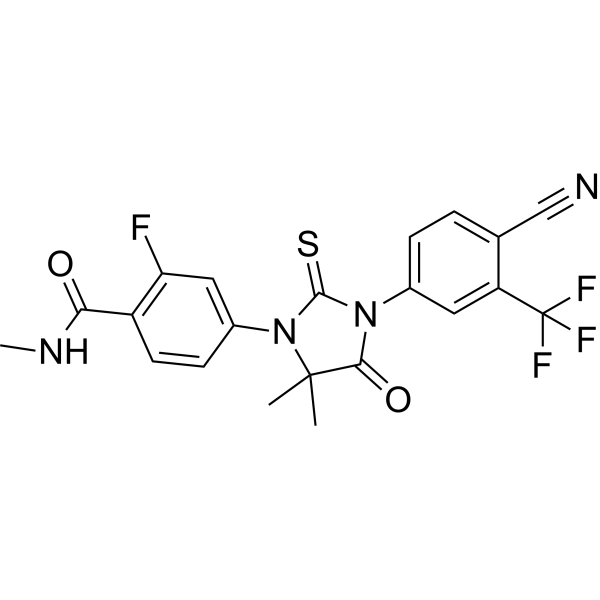
-
- HY-16985
-
|
ODM-201; BAY-1841788
|
Androgen Receptor
|
Cancer
|
|
Darolutamide (ODM-201;BAY-1841788) is a potent androgen receptor (AR) antagonist with an IC50 of 26 nM in in vitro assay.
|
-
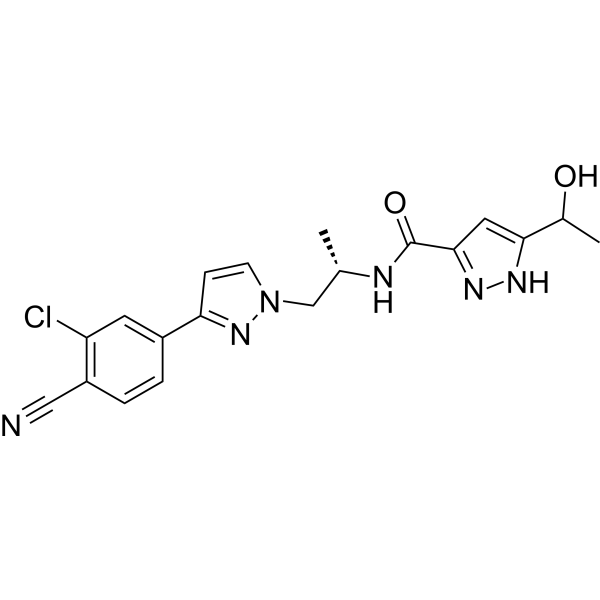
-
- HY-16060S1
-
|
ARN-509-d3
|
Androgen Receptor
|
Cancer
|
|
Apalutamide-d3 is the deuterium labeled Apalutamide[1]. Apalutamide (ARN-509) is a potent and competitive androgen receptor (AR) antagonist, binding AR with an IC50 of 16 nM[2].
|
-
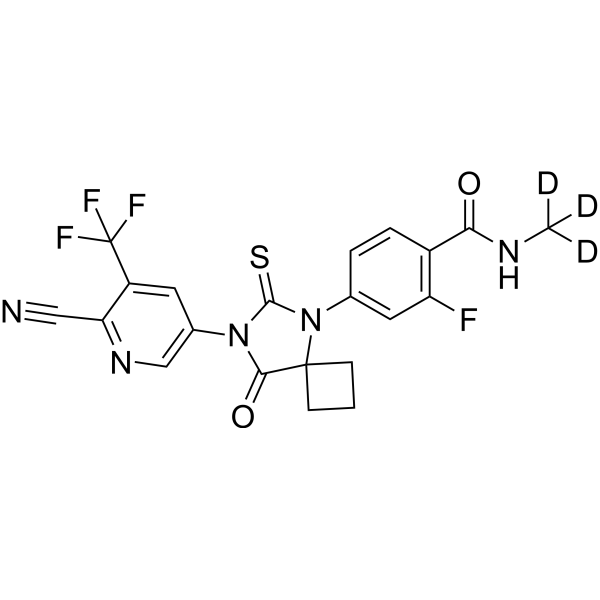
-
- HY-W653723
-
|
NDCHA
|
Androgen Receptor
|
Endocrinology
|
|
N-Nitrosodicyclohexylamine (NDCHA) is a N-nitrosocompound with anti-androgenic activities. N-Nitrosodicyclohexylamine shows the competitive binding to androgen receptor (AR) against 5α-dihydrotestosterone and decreased the level of AR protein .
|
-
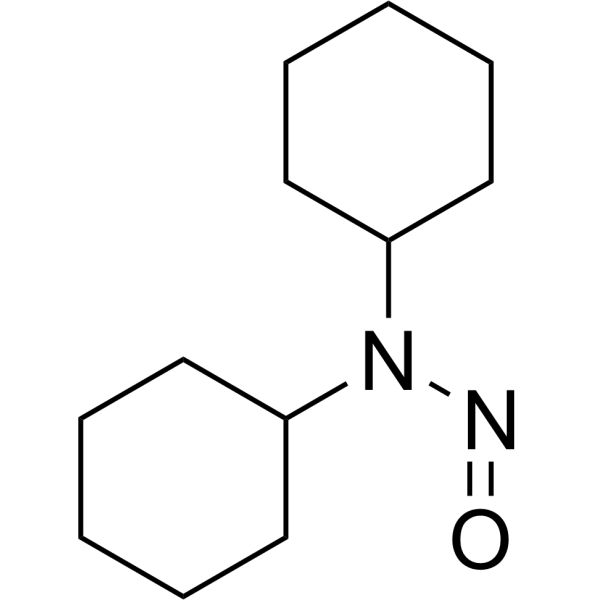
-
- HY-131388
-
-
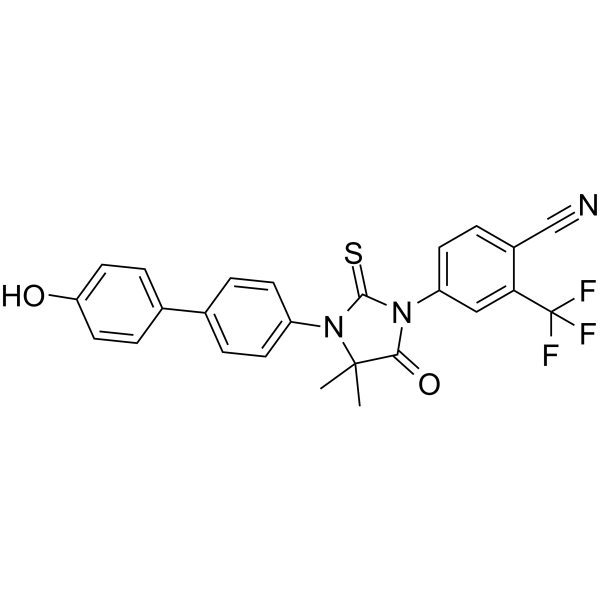
-
- HY-156111
-
|
|
PROTACs
Androgen Receptor
|
Cancer
|
|
ARD-1676 is an orally available androgen receptor (AR) PROTAC degrader, consisting of AR ligand and cereblon ligand. ARD-1676 has AR-degrading activity in vitro and in vivo and inhibits VCaP tumor growth in mouse xenograft tumor models .
|
-
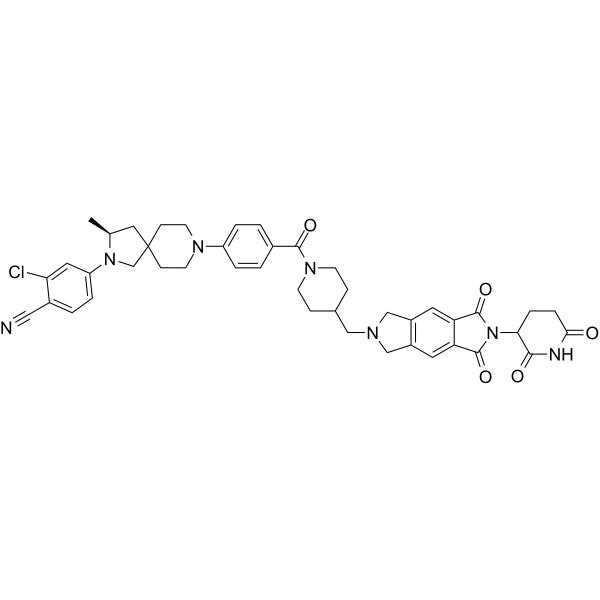
-
- HY-158101
-
|
CC-94676
|
Androgen Receptor
|
Cancer
|
|
BMS-986365 is a selective heterobifunctional ligand-directed degrader (LDD) targeting the androgen receptor (AR). BMS-986365 demonstrated significant in vivo potency, degrading AR, inhibiting AR signaling, and inhibiting tumor growth in animal models of advanced prostate cancer.
|
-
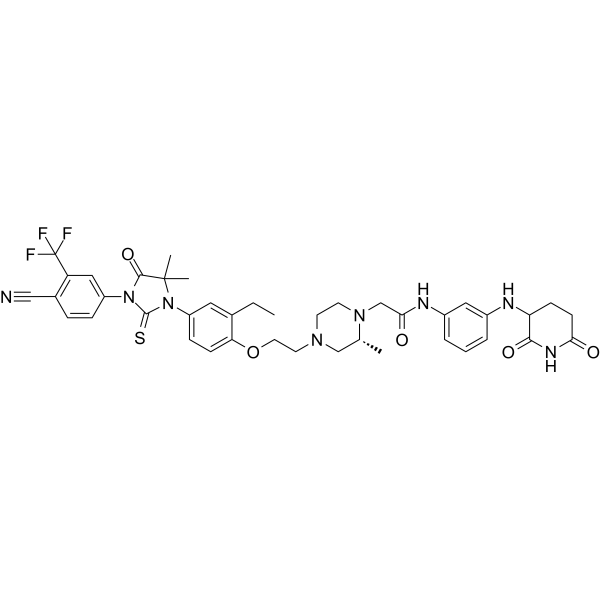
-
- HY-144127
-
|
|
Androgen Receptor
|
Cancer
|
|
AR antagonist 3 is a potent and selective androgen receptor (AR) antagonist with an IC50 of 0.47 µM. AR antagonist 3 exhibits a dose-dependent decrease of the FRET signal (IC50= 18.05 μM). AR antagonist 3 shows effective inhibition on tumor growth when administered intratumorally .
|
-
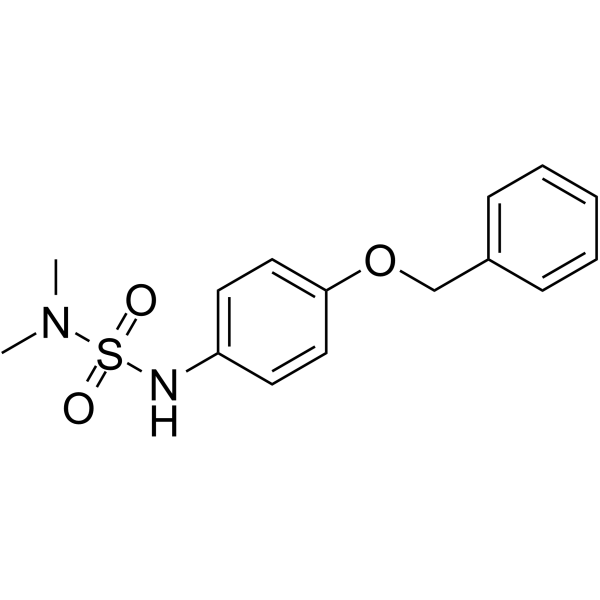
-
- HY-111848A
-
|
|
SNIPERs
PROTACs
Androgen Receptor
|
Cancer
|
|
PROTAC AR Degrader-4 comprises a IAP ligand binding group, a linker and an Androgen Receptor (AR) binding group. PROTAC AR Degrader-4 is an AR degrader. Degradation inducers based on cIAP1 are called specific and non-genetic IAP-dependent protein erasers (SNIPERs) .
|
-
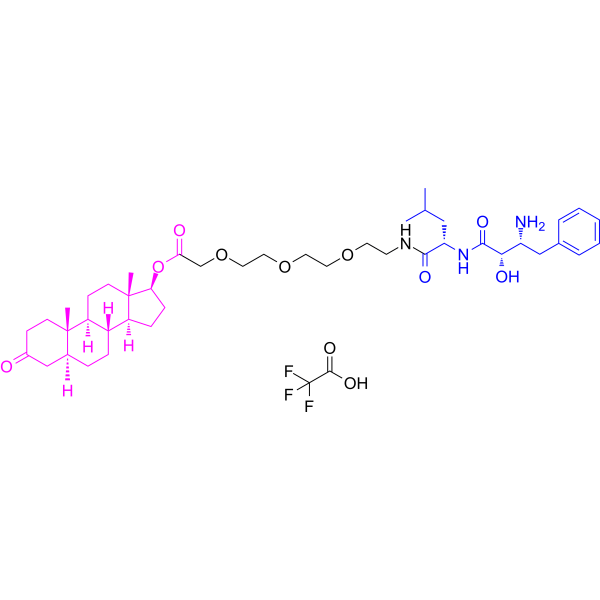
-
- HY-111848
-
|
|
SNIPERs
PROTACs
Androgen Receptor
|
Cancer
|
|
PROTAC AR Degrader-4 comprises a IAP ligand binding group, a linker and an Androgen Receptor (AR) binding group. PROTAC AR Degrader-4 is an AR degrader. Degradation inducers based on cIAP1 are called specific and non-genetic IAP-dependent protein erasers (SNIPERs) .
|
-
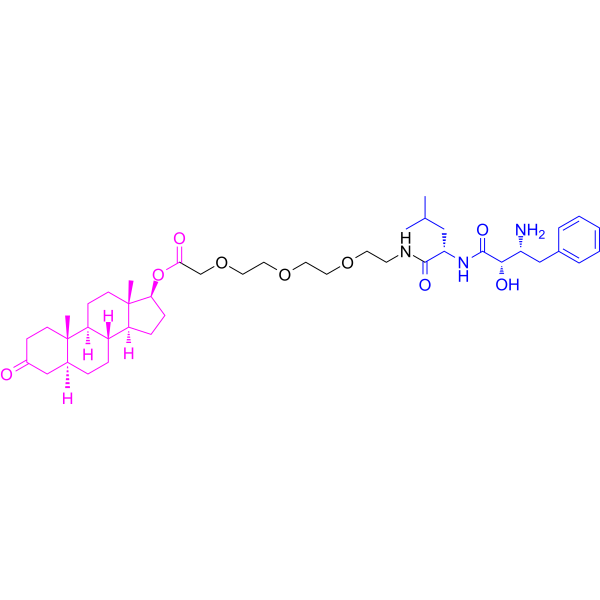
-
- HY-130845
-
-
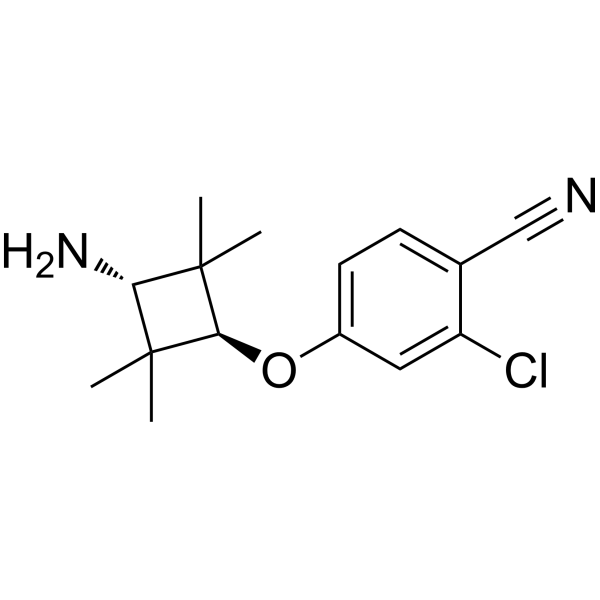
-
- HY-149433
-
|
|
Androgen Receptor
Apoptosis
|
Cancer
|
|
BWA-522 is an orally available small molecule protein-targeting chimera (PROTACs) with significant degradation effect on AR-FL and AR-V7. BWA-522 antagonizes the N-terminal domain (AR-NTD) of the androgen receptor (Androgen Receptor) and induces apoptosis in PC cells. BWA-522 inhibits tumor growth in LNCaP xenograft model studies (60 mg/kg, po; TGI=76%). The efficiencies of BWA-522 in degrading AR-V7 and AR-FL were 77.3% (1 μM) and 72.0% (5 μM) in VCaP and LNCaP cells, respectively .
|
-
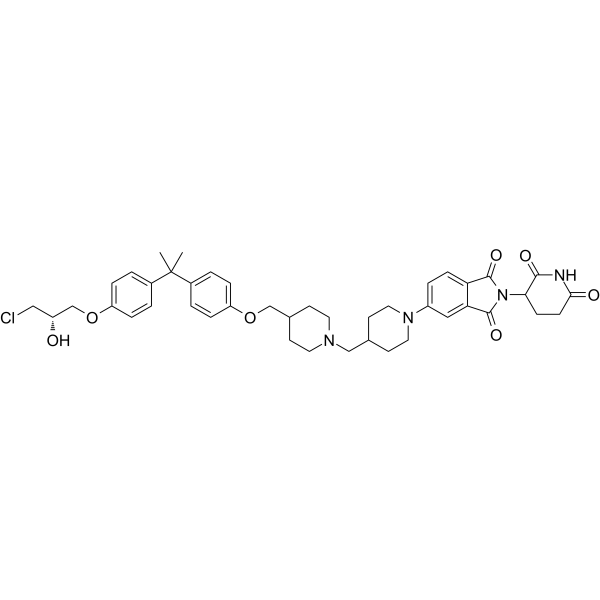
- HY-123308
-
|
|
Androgen Receptor
|
Cancer
|
|
VPC13163 is a potent androgen receptor (AR) BF3 inhibitor with an IC50 of 0.31 µM. VPC13163 has anticancer effects .
|
-
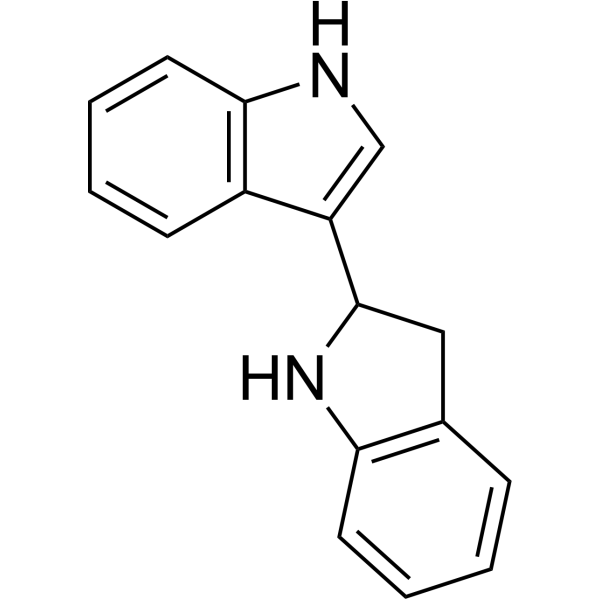
- HY-150102
-
|
|
Androgen Receptor
|
Cancer
|
|
EPI-7170, a ralaniten analogue, is a potent androgen receptor N-terminal structural domain antagonist that blocks the transcriptional activity of full-length AR (FL-AR) and AR splice variants (AR-Vs). EPI-7170 has antitumor effects against enzalutamide resistant castration-resistant prostate cancer (CRPC) .
|
-
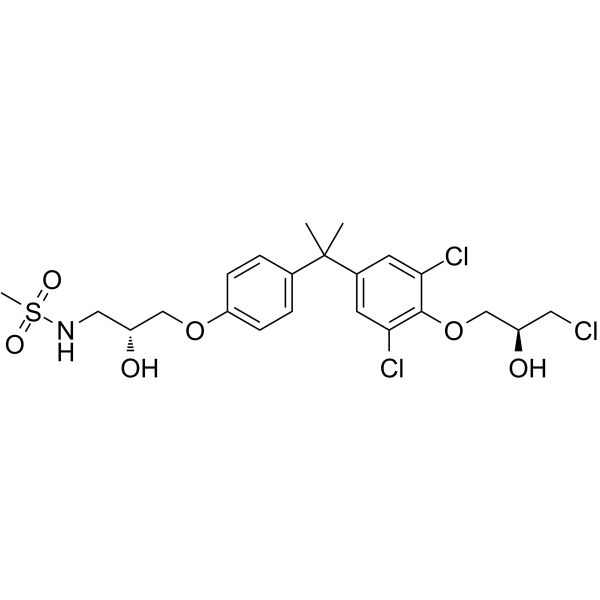
- HY-16060S2
-
|
ARN-509-13C,d3
|
Isotope-Labeled Compounds
Androgen Receptor
|
Cancer
|
|
Apalutamide- 13C,d3 is the 13C- and deuterium labeled Apalutamide. Apalutamide (ARN-509) is a potent and competitive androgen receptor (AR) antagonist, binding AR with an IC50 of 16 nM[1].
|
-
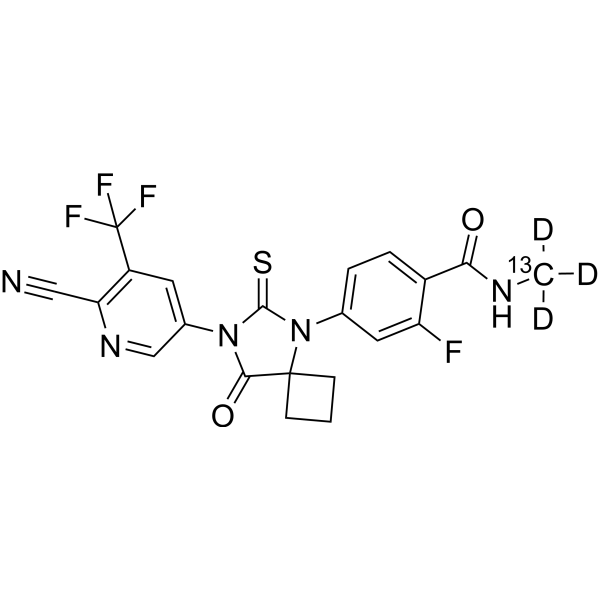
- HY-130845A
-
-
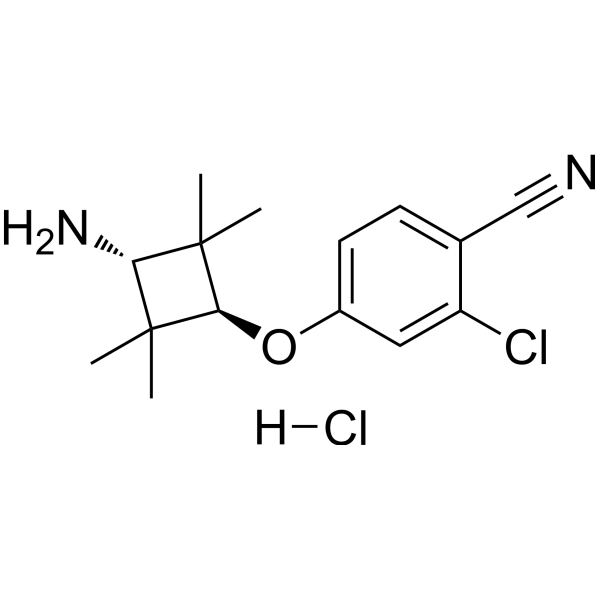
- HY-135794
-
|
11-KDHT; 5α-Dihydro-11-keto testosterone
|
Androgen Receptor
|
Endocrinology
|
|
11-Ketodihydrotestosterone (11-KDHT; 5α-Dihydro-11-keto testosterone) is an endogenous steroid and a metabolite of 11β-Hydroxyandrostenedione. 11-Ketodihydrotestosterone is an active androgen and is also a potent androgen receptor (AR) agonist with a Ki of 20.4 nM and an EC50 of 1.35 nM for human AR. 11-Ketodihydrotestosterone drives gene regulation, protein expression and cell growth in androgen-dependent prostate cancer cells .
|
-
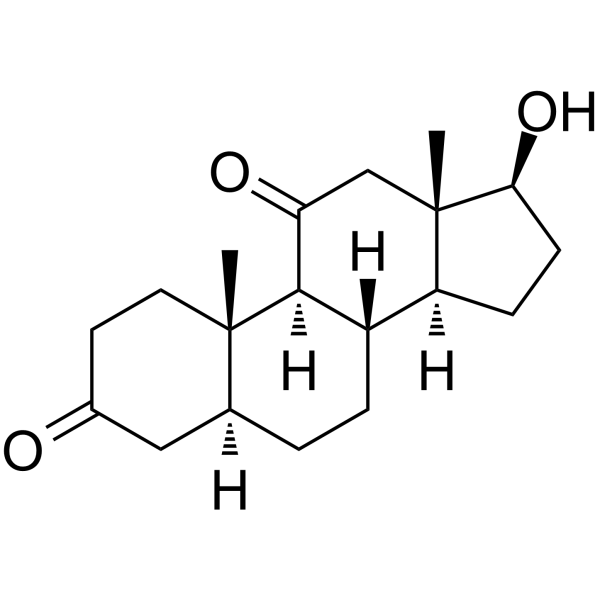
- HY-117953
-
|
|
Prostaglandin Receptor
|
Endocrinology
|
|
RU 59063 is an N-substituted arylthiohydantoin compound with antiandrogenic activity and high relative binding affinity for the rat androgen receptor. RU 59063 is a nonsteroidal androgen receptor that functions as a radioactive AR radioprobe (Ki: 0.71 nM, rAR) when its trifluoromethyl group is replaced by a similar hydrophobic iodine atom .
|
-
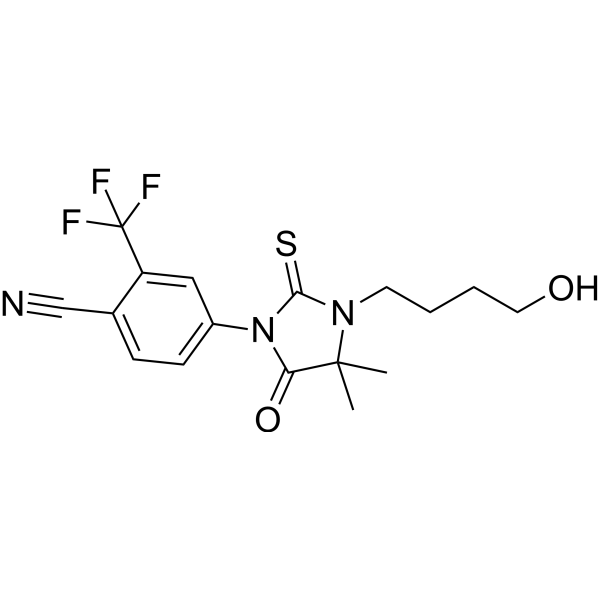
- HY-14250
-
|
|
Androgen Receptor
|
Endocrinology
|
|
PF-998425 is a potent, selective nonsteroidal androgen receptor (AR) antagonist with an IC50 of 37 nM and 43 nM in AR binding and cellular assays, respectively. PF-998425 has low activity on common receptors and enzymes, such as progesterone receptor. PF-998425 can be used for sebum control and androgenetic alopecia research .
|
-
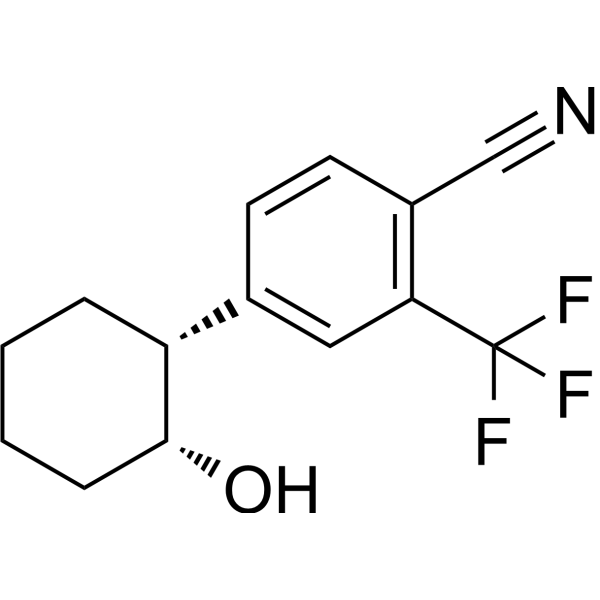
- HY-70002S1
-
|
MDV3100-d6
|
Androgen Receptor
|
Cancer
|
|
Enzalutamide-d6 is a deuterium labeled Enzalutamide (MDV3100). Enzalutamide is an androgen receptor (AR) antagonist with an IC50 of 36 nM in LNCaP prostate cells[1].
|
-
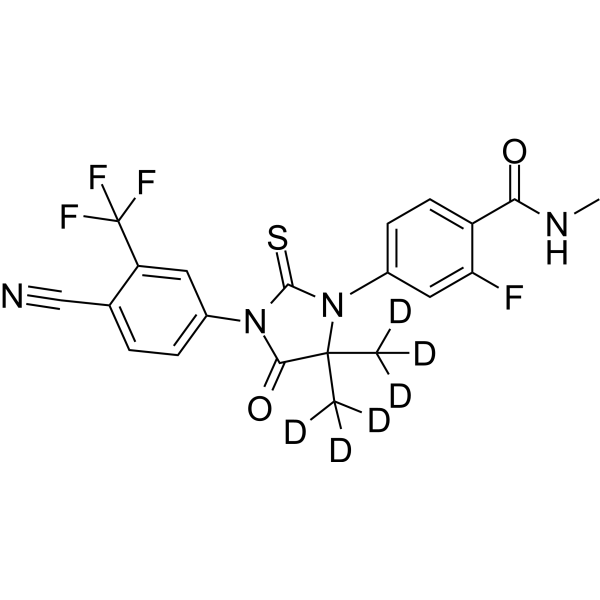
- HY-W013249
-
|
|
PROTAC Linkers
|
Cancer
|
|
Boc-piperazine-benzoic acid is a PROTAC linker and can be used in the synthesis of PROTACs, such as PROTAC androgen receptor (AR) degrader ARD-2128 (HY-13229) .
|
-
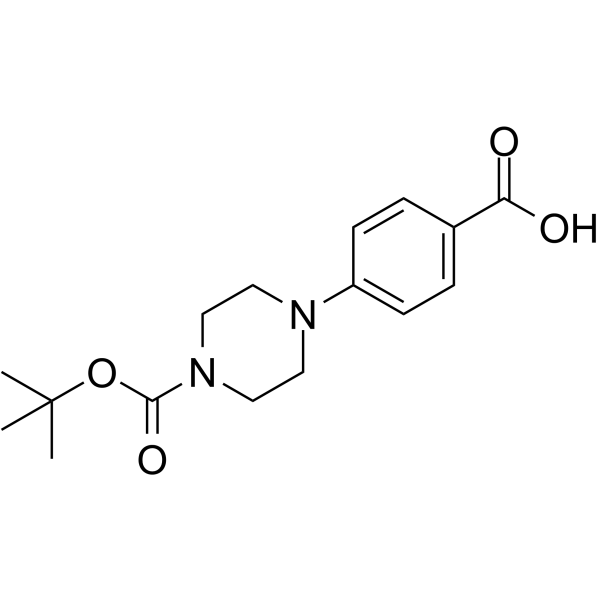
- HY-160020
-
|
|
Androgen Receptor
|
Cancer
|
|
ET516 is a potent inhibitor of Androgen Receptor. ET516 significantly inhibits the proliferation and tumor growth of prostate cancer cells expressing AR-resistant mutants .
|
-
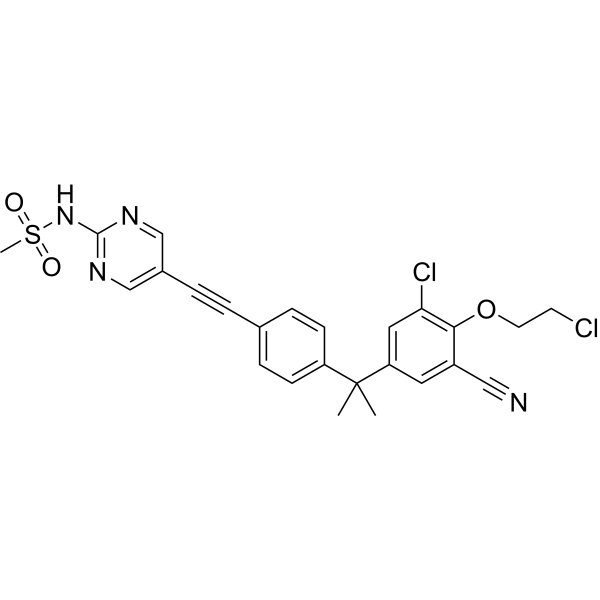
- HY-116501
-
|
|
Androgen Receptor
|
Cancer
|
|
VPC-14449 is a potent and selective inhibitor of the DNA-binding domain of the androgen receptor (AR-DBD), with IC50 of 0.34 μM for full-length human AR. VPC-14449 reduces the ability of full-length AR as well as AR variants to interact with chromatin. VPC-14449 can be used for the research of prostate cancer .
|
-
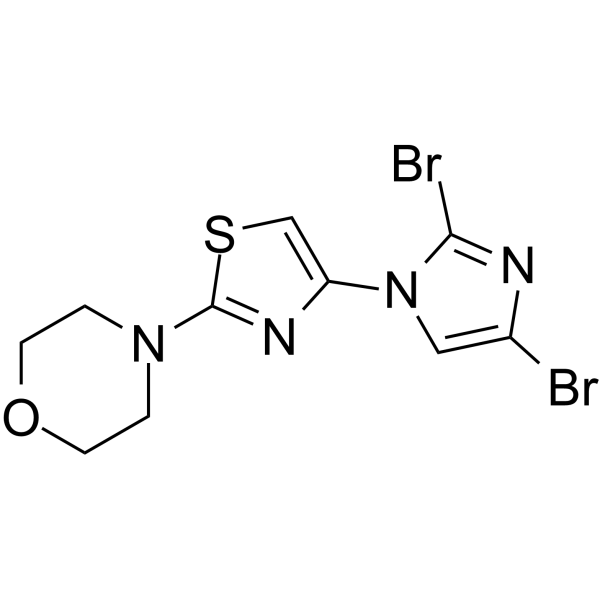
- HY-155543
-
|
|
Androgen Receptor
|
Cancer
|
|
Anticancer agent 135 (compound 26h) is a potent androgen receptor (AR) antagonist. Anticancer agent 135 can effectively block AR nuclear translocation and inhibit AR/AR-V7 heterodimerization, thereby inhibiting downstream gene transcription. Anticancer agent 135 displays potent robust efficacy in prostate cancer xenograft models .
|
-
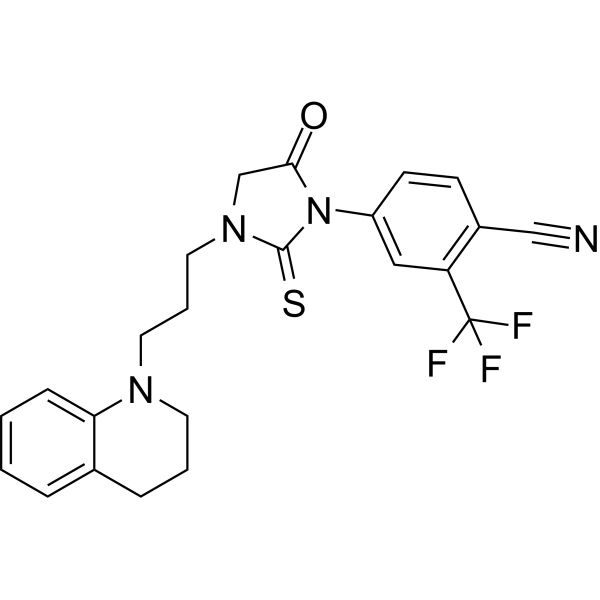
- HY-148777
-
|
|
PROTACs
Androgen Receptor
|
Cancer
|
|
A031 is a highly effective PROTAC androgen receptor (AR) degrader with an IC50 value less than 0.25 μM for AR protein degradation. A031 has an inhibitory effect on tumor growth in zebrafish with human prostate cancer (VCaP) .
|
-
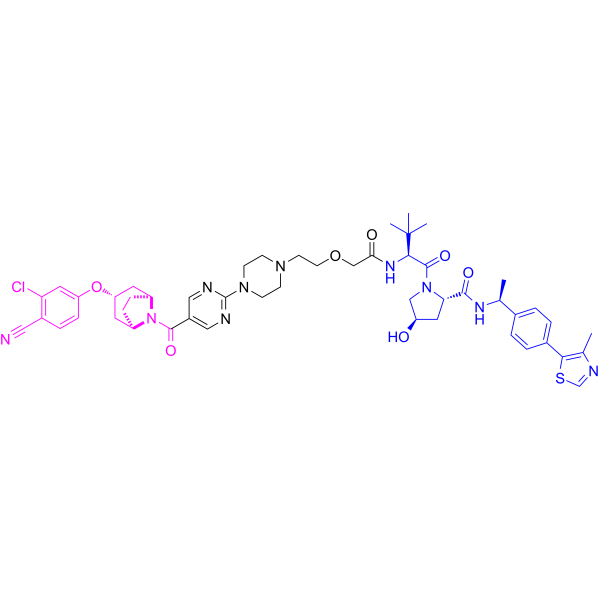
- HY-112257
-
S-23
1 Publications Verification
|
Androgen Receptor
|
Metabolic Disease
|
|
S-23 is an orally active selective androgen receptor modulator (SARM) with a Ki of 1.7 nM. S-23 induces androgen receptor (AR)-mediated transcriptional activation in CV-1 cells. S-23 increases prostate, seminal vesicle, and levator ani muscle weights in castrated rats .
|
-
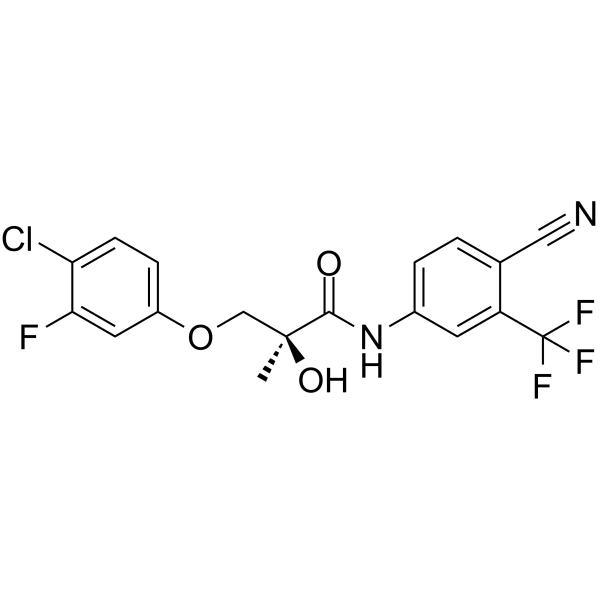
- HY-123875A
-
|
EPI-506
|
Androgen Receptor
|
Cancer
|
|
Ralaniten triacetate (EPI-506), the pro-agent of Ralaniten, is a first-in-class, orally active androgen receptor (AR) N-terminal domain (NTD) inhibitor. Ralaniten triacetate shows activity against both full length and resistance-related AR species, including AR-v7 .
|
-
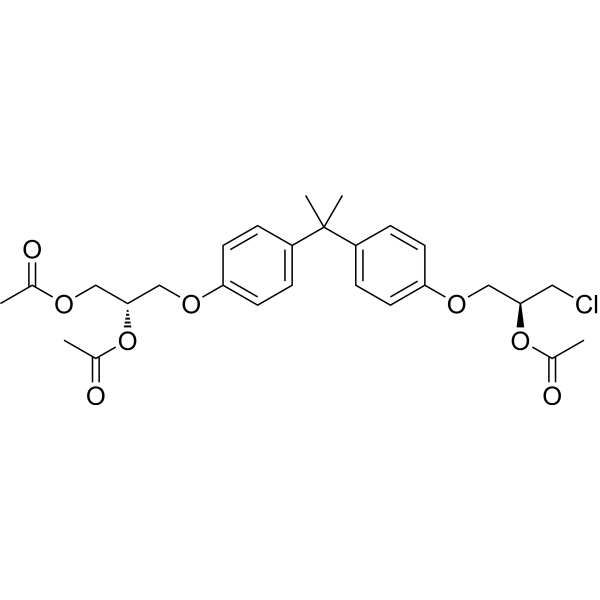
- HY-70002S
-
|
Enzalutamide-d3; MDV3100-d3
|
Androgen Receptor
Autophagy
|
Cancer
|
|
Deutenzalutamide (Enzalutamide-d3) is a developed deuterium labeled Enzalutamide (MDV3100). Enzalutamide is an androgen receptor (AR) antagonist with an IC50 of 36 nM in LNCaP prostate cells .
|
-
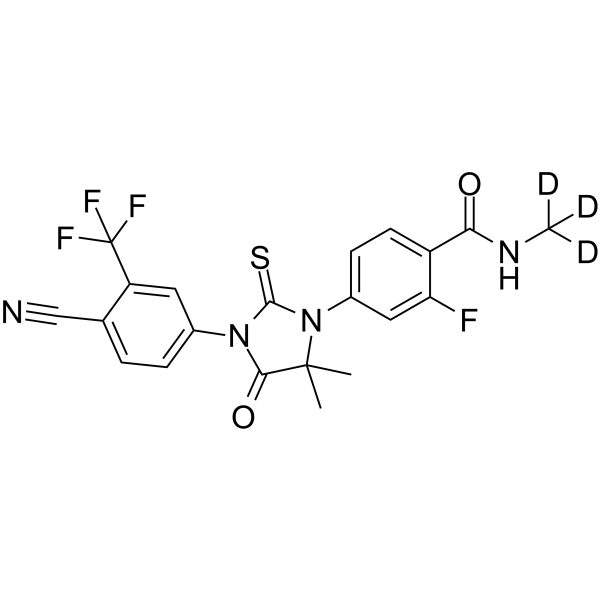
- HY-160262
-
-
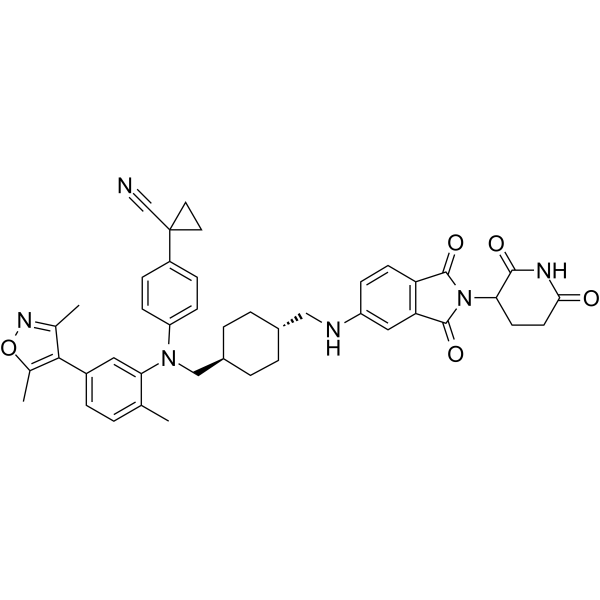
- HY-130492
-
|
|
PROTACs
Androgen Receptor
|
Cancer
|
|
ARCC-4 is a low-nanomolar Androgen Receptor (AR) degrader based on PROTAC, with a DC50 of 5 nM. ARCC-4 is an enzalutamide-based von Hippel-Lindau (VHL)-recruiting AR PROTAC and outperforms enzalutamide. ARCC-4 effectively degrades clinically relevant AR mutants associated with antiandrogen therapy .
|
-
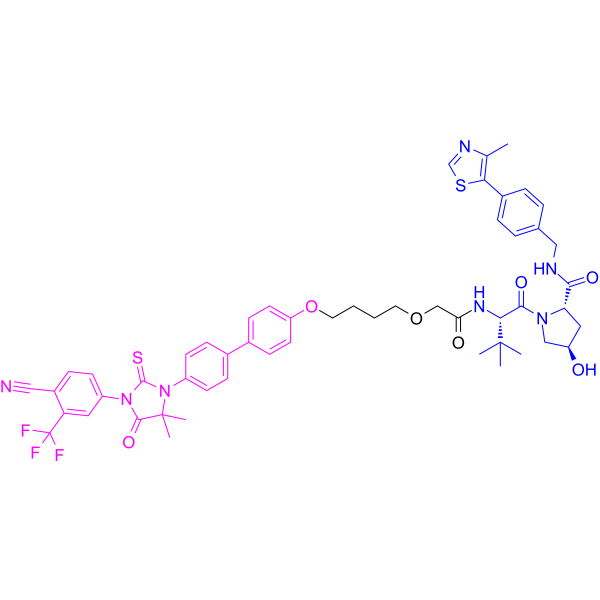
- HY-115282A
-
|
TRC-253
|
Androgen Receptor
|
Cancer
|
|
JNJ-63576253 (TRC-253) is a potent and orally active full antagonist of androgen receptor (AR), with IC50s of 37 and 54 nM for F877L mutant AR and wild-type AR in LNCaP cells. JNJ-63576253 can be used for the research of castration-resistant prostate cancer (CRPC) .
|
-
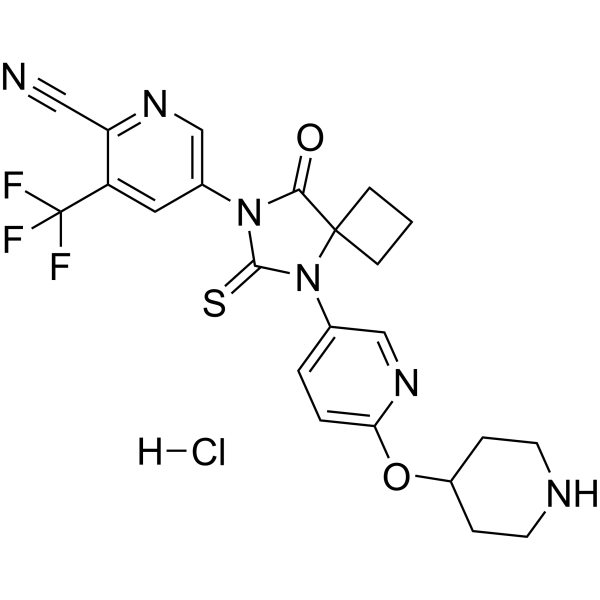
- HY-132292
-
|
|
PROTACs
Androgen Receptor
|
Cancer
|
|
ARD-2128 is a highly potent, orally bioavailable PROTAC androgen receptor (AR) degrader. ARD-2128 effectively reduces AR protein, suppresses AR-regulated genes in tumor tissues, and inhibits growth of tumor without signs of toxicity. ARD-2128 has the potential for the research of the prostate cancer .
|
-
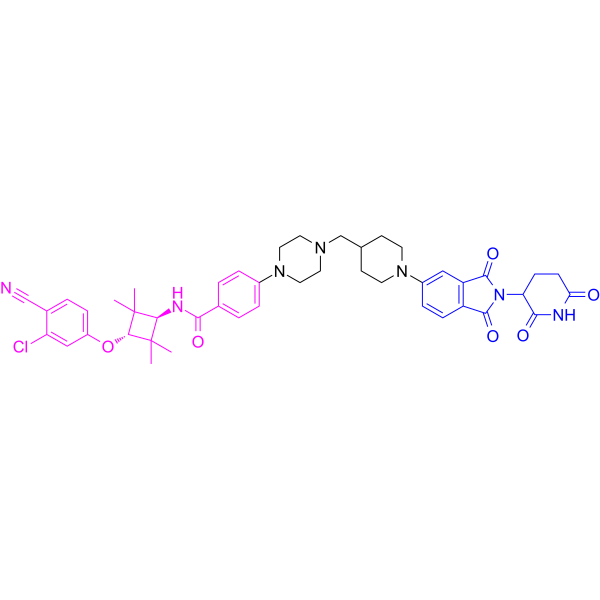
- HY-153342
-
|
ARV-766
|
PROTACs
Androgen Receptor
|
Cancer
|
|
ARV-766 is an orally active and potent proteolysis targeting chimera (PROTAC) protein degrader. ARV-766 degrades wild-type androgen receptor (AR) but also relevant AR LBD mutants, including the most prevalent AR L702H, H875Y, and T878A mutations .
|
-
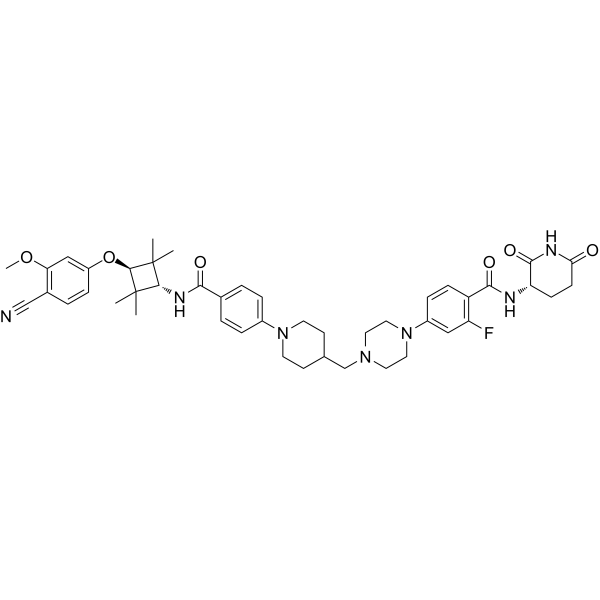
- HY-145709
-
|
|
Androgen Receptor
|
Cancer
|
|
Ar-V7-IN-1 is a potent inhibitor of Ar-V7. AR-V7 is a hormone-independent splice variant of the androgen receptor. Ar-V7-IN-1 has the potential for the research of various indications, in particular cancers such as prostate cancer (extracted from patent WO2018114781A1, compound 43) .
|
-
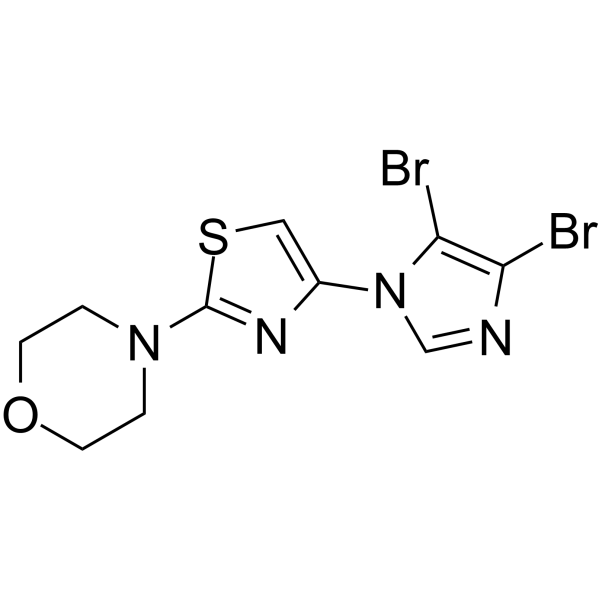
- HY-125839
-
|
|
Glucocorticoid Receptor
|
Inflammation/Immunology
Endocrinology
|
|
OP-3633 is a potent and selective steroidal glucocorticoid receptor (GR) antagonist with an IC50 of 29 nM, with inhibition of GR transcriptional activity. OP-3633 exhibits low progesterone receptor (PR) agonism and androgen receptor (AR) antagonism .
|
-
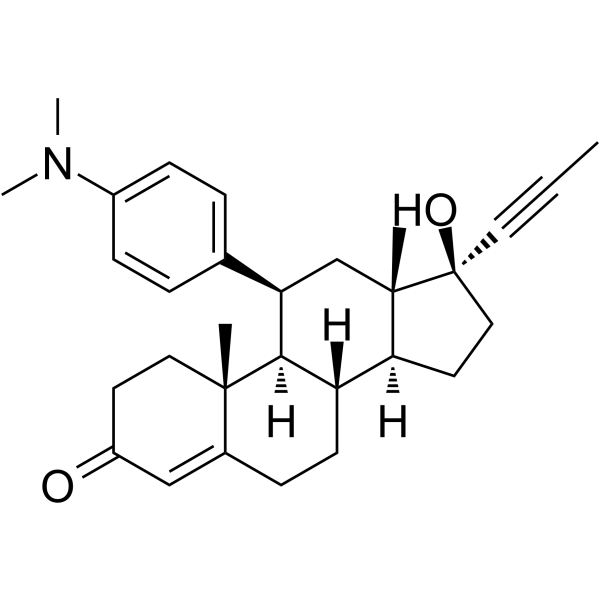
- HY-109070
-
|
EPI-002
|
Androgen Receptor
|
Cancer
|
|
Ralaniten (EPI-002) is a potent and orally active antagonist of the androgen receptor-N-terminal domain (AR-NTD). Ralaniten inhibits AR transcriptional activity, with IC50 of 7.4 μM. Ralaniten can be used for the research of castration-resistant prostate cancer (CRPC) .
|
-
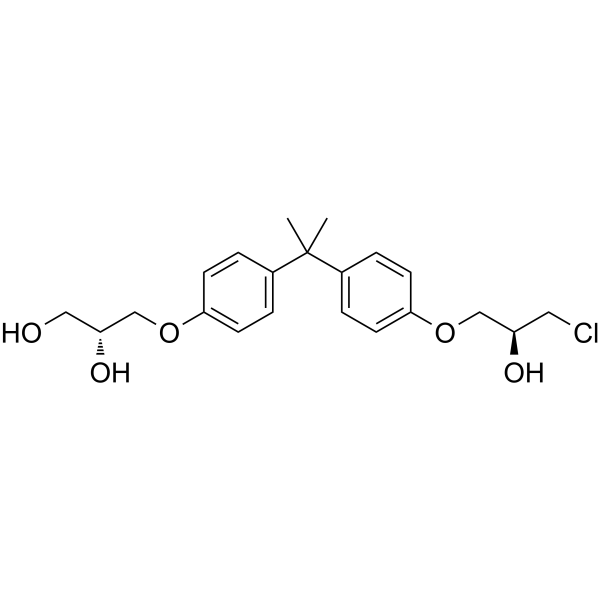
- HY-14250A
-
|
|
Androgen Receptor
|
Endocrinology
|
|
(Rac)-PF-998425 is a potent, selective, nonsteroidal androgen receptor (AR) antagonist. (Rac)-PF-998425 has IC50 values of 26 and 90 nM in the AR binding and cellular assays, respectively. (Rac)-PF-998425 has the potential for the research of the androgenetic alopecia .
|
-
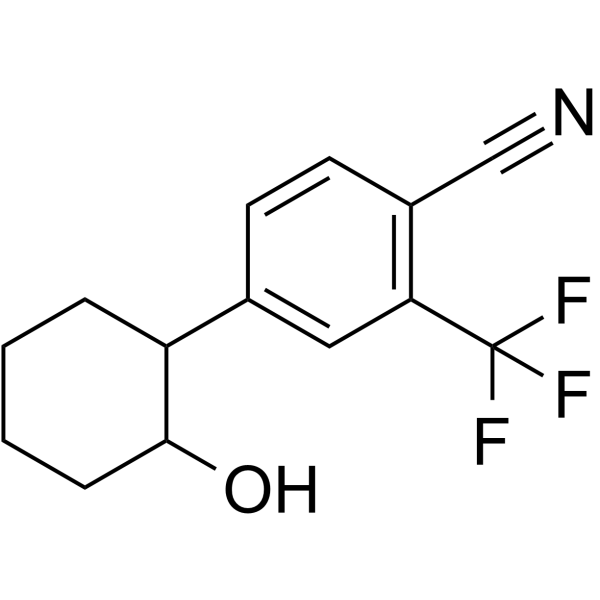
- HY-14249S
-
-
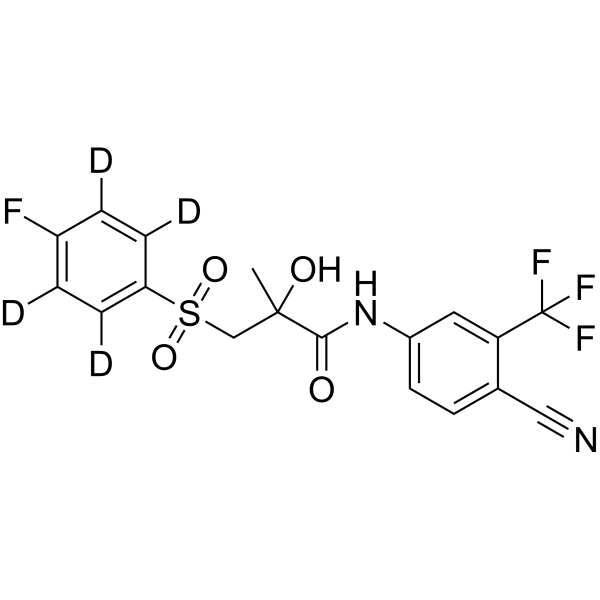
- HY-108250
-
|
|
Androgen Receptor
|
Cancer
|
|
(R)-Bicalutamide is the (R)-enantiomer of Bicalutamide (HY-14249). (R)-Bicalutamide is an androgen receptor (AR) antagonist, with antineoplastic activity. (R)-Bicalutamide is widely used for the research of prostate cancer .
|
-
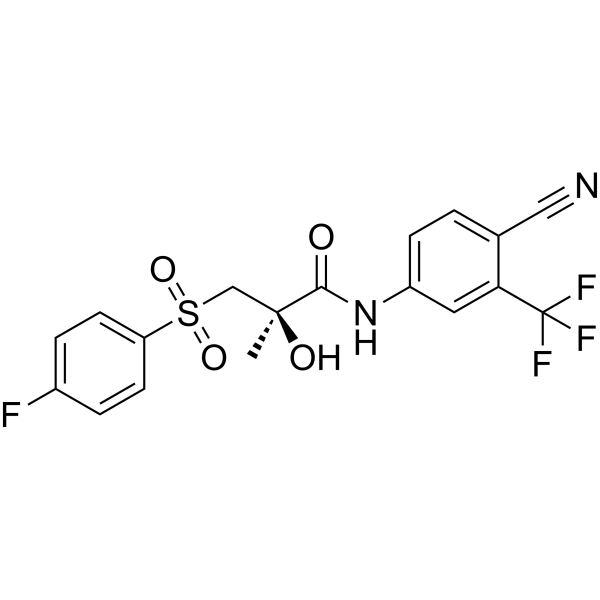
- HY-124292
-
|
Honokiol dichloroacetate
|
Androgen Receptor
|
Cancer
|
|
Honokiol DCA (Honokiol dichloroacetate) is a dichloroacetate analog of Honokiol. Honokiol DCA can inhibit the growth of human prostate cancer cells in vitro and suppress the androgen receptor (AR) protein level .
|
-
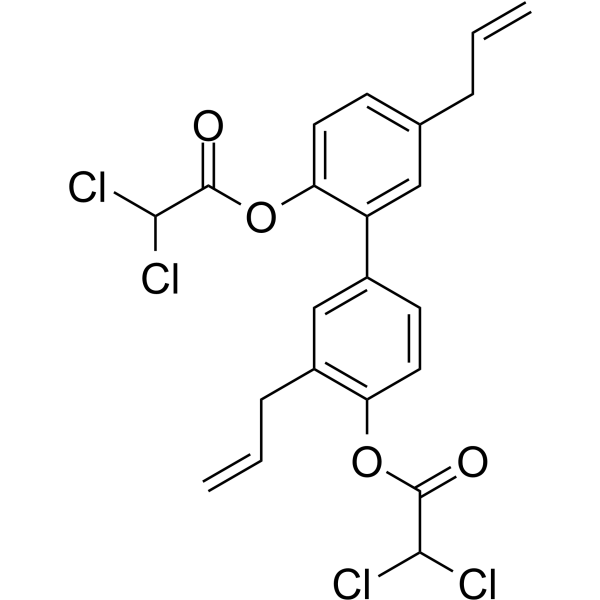
- HY-163340
-
|
|
Glucocorticoid Receptor
Androgen Receptor
|
Cancer
|
|
GA32 (compound 58r) is potent androgen receptor (AR)/glucocorticoid receptor (GR) dual inhibitor with IC50 values of 0.13 μM and 0.83 μM for AR and GR, respectively. GA32 inhibits the proliferation of Enzalutamide (HY-70002) resistance castration-resistant prostate cancer both in vitro and in vivo .
|
-
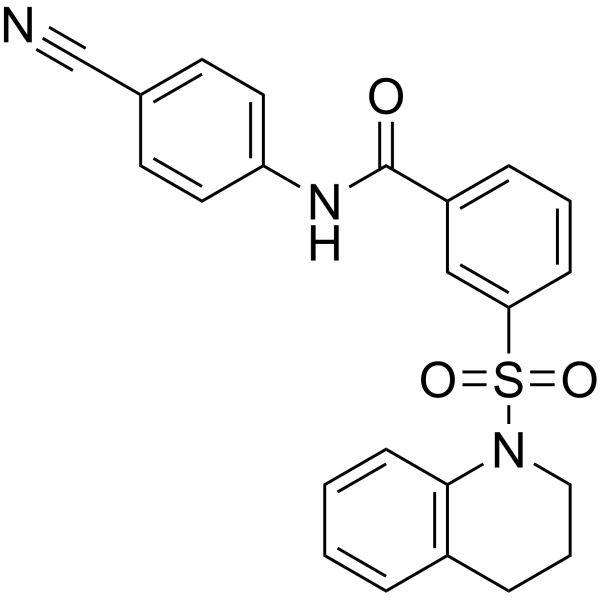
- HY-115282
-
|
TRC-253 free base
|
Androgen Receptor
|
Cancer
|
|
JNJ-63576253 (TRC-253) free base is a potent and orally active full antagonist of androgen receptor (AR), with IC50s of 37 and 54 nM for F877L mutant AR and wild-type AR in LNCaP cells. JNJ-63576253 free base can be used for the research of castration-resistant prostate cancer (CRPC) .
|
-
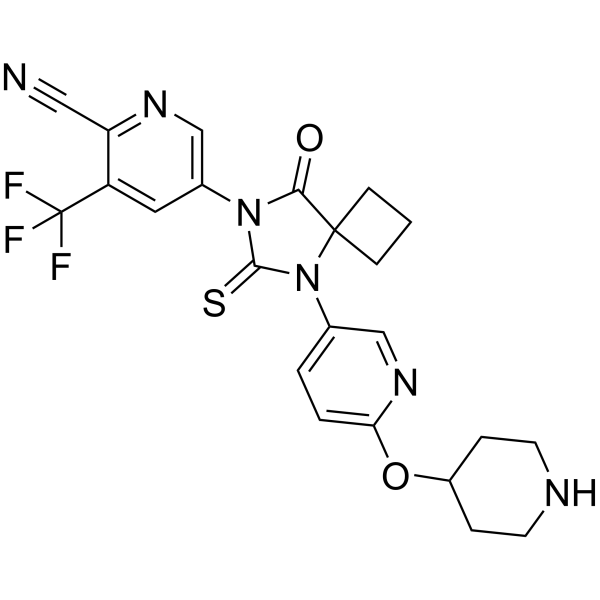
- HY-13613
-
|
GG 745; GI 198745
|
5 alpha Reductase
Apoptosis
|
Cancer
|
|
Dutasteride (GG745) is a potent inhibitor of both 5α-reductase isozymes. Dutasteride may possess off-target effects on the androgen receptor (AR) due to its structural similarity to DHT .
|
-
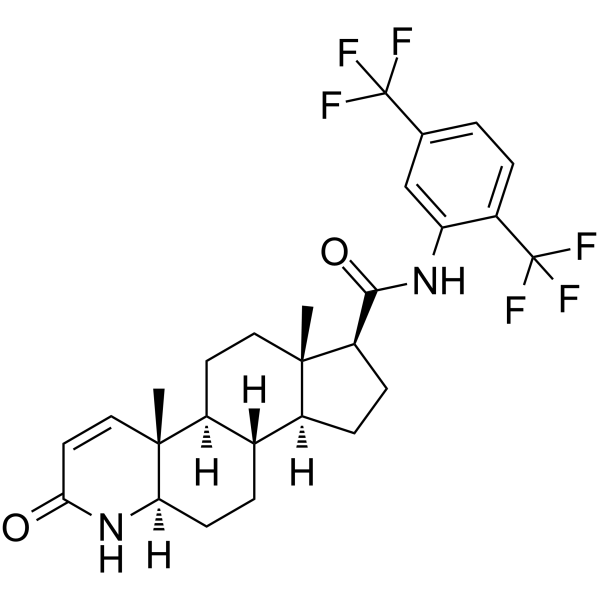
- HY-141487
-
-
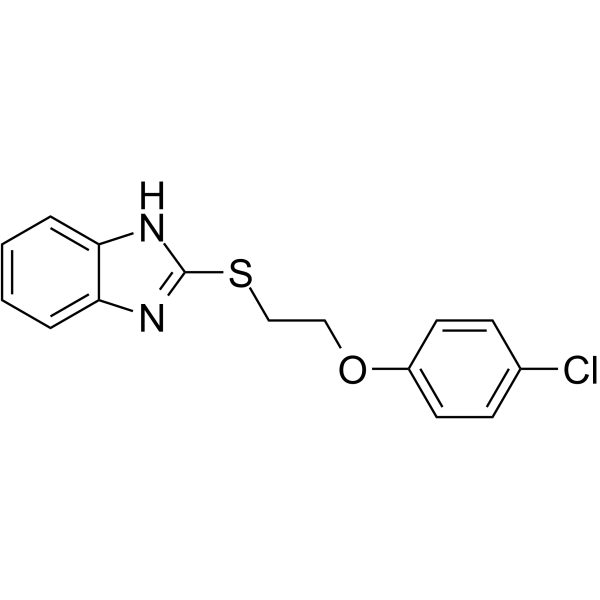
- HY-153918
-
|
|
Androgen Receptor
|
Cancer
|
|
(R)-SKBG-1 is an RNA-binding protein NONO inhibitor. (R)-SKBG-1 suppresses androgen receptor expression with IC50s of 3.1 μM and 5.5 μM against AR-FL mRNA and AR-V7 mRNA, respectively .
|
-
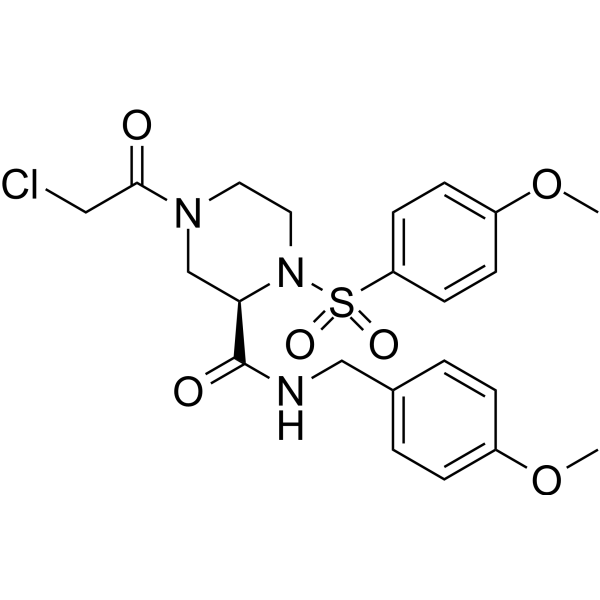
- HY-135794S
-
|
11-KDHT-d3; 5α-Dihydro-11-keto testosterone-d3
|
Androgen Receptor
|
Endocrinology
|
|
11-Ketodihydrotestosterone-d3 is the deuterium labeled 11-Ketodihydrotestosterone. 11-Ketodihydrotestosterone (11-KDHT; 5α-Dihydro-11-keto testosterone) is an endogenous steroid and a metabolite of 11β-Hydroxyandrostenedione. 11-Ketodihydrotestosterone is an active androgen and is also a potent androgen receptor (AR) agonist with a Ki of 20.4 nM and an EC50 of 1.35 nM for human AR. 11-Ketodihydrotestosterone drives gene regulation, protein expression and cell growth in androgen-dependent prostate cancer cells[1][2].
|
-
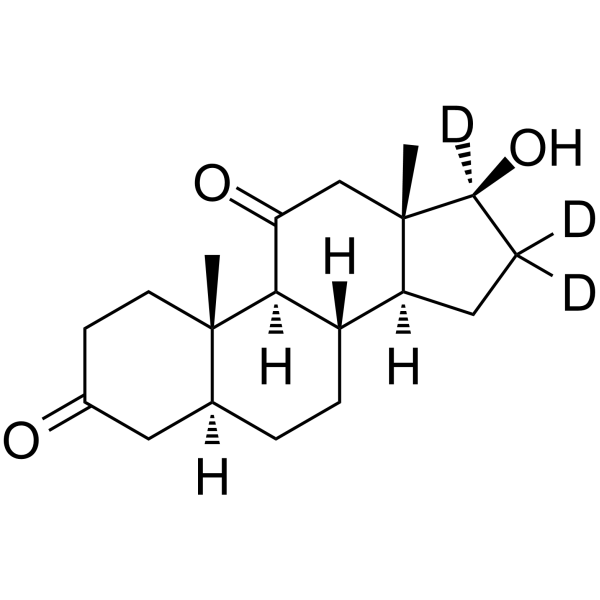
- HY-149434
-
|
|
Androgen Receptor
Apoptosis
|
Cancer
|
|
PROTAC AR-NTD antagonist 1 (compound 18) is a small molecule protein-targeting chimera (PROTACs) targeting the Androgen Receptor AR-V7. PROTAC AR-NTD antagonist 1 antagonizes the N-terminal domain of AR (AR-NTD), degrades AR-V7 protein, and induces apoptosis in prostate cancer (PC) cells. The efficiencies of PROTAC AR-NTD antagonist 1 in degrading AR-V7 in VCaP cells were 62.2% (1 μM) and 71.1% (5 μM), respectively .
|
-
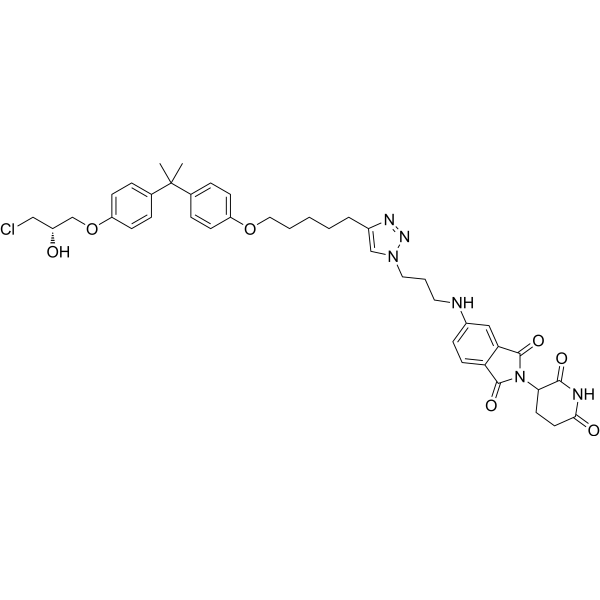
- HY-112256
-
ACP-105
5 Publications Verification
|
Androgen Receptor
|
Inflammation/Immunology
|
|
ACP-105 is an orally available, selective amd potent androgen receptor modulator (SARM), with pEC50s of 9.0 and 9.3 for AR wild type and T877A mutant, respectively.
|
-
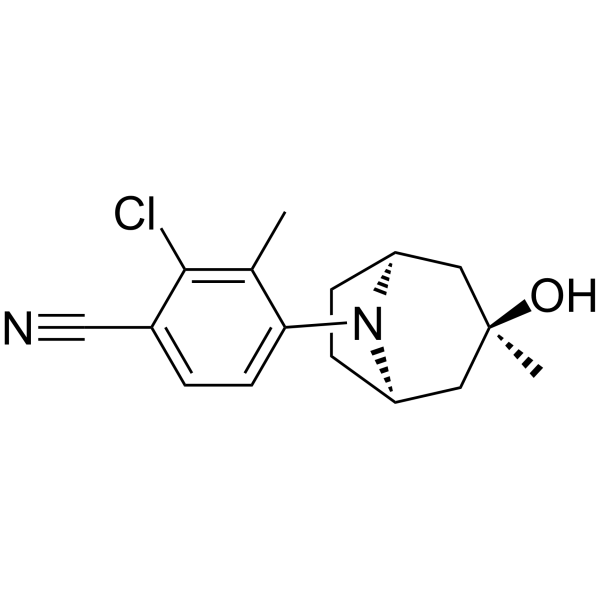
- HY-14249S1
-
-
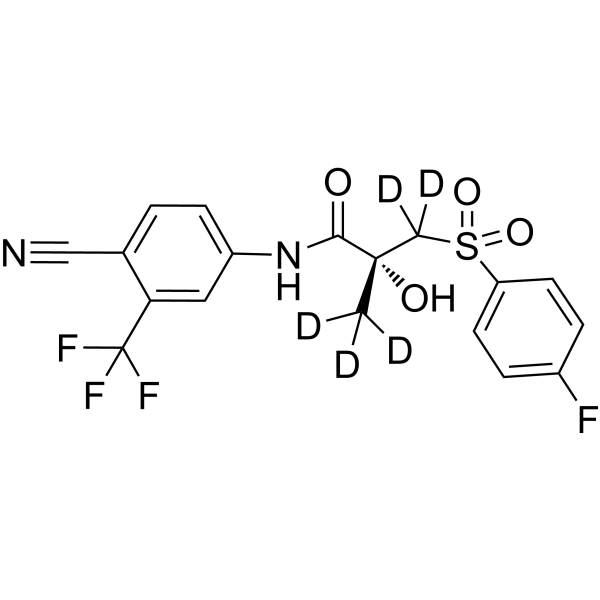
- HY-14249R
-
|
|
Androgen Receptor
Autophagy
|
Cancer
|
|
Bicalutamide (Standard) is the analytical standard of Bicalutamide. This product is intended for research and analytical applications. Bicalutamide is an orally active non-steroidal androgen receptor (AR) antagonist. Bicalutamide can be used for the research of prostate cancer .
|
-

- HY-N0790
-
Lupeol
3 Publications Verification
Clerodol; Monogynol B; Fagarasterol
|
Androgen Receptor
Apoptosis
|
Cancer
|
|
Lupeol (Clerodol; Monogynol B; Fagarasterol) is an active pentacyclic triterpenoid, has anti-oxidant, anti-mutagenic, anti-tumor and anti-inflammatory activity. Lupeol is a potent androgen receptor (AR) inhibitor and can be used for cancer research, especially prostate cancer of androgen-dependent phenotype (ADPC) and castration resistant phenotype (CRPC) .
|
-
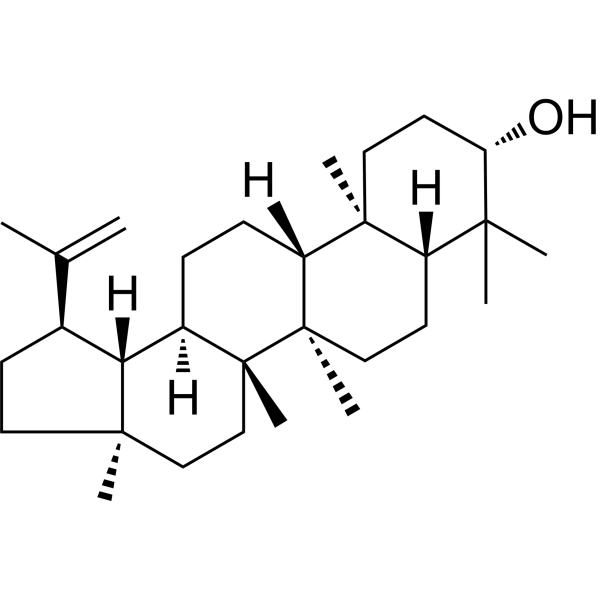
- HY-B0111
-
|
Dihydrospirorenone
|
Progesterone Receptor
Androgen Receptor
|
Endocrinology
Cancer
|
|
Drospirenone (Dihydrospirorenone) is an orally active fourth-generation progestin that interacts with the progesterone receptor (PR) and androgen receptor (AR). Drospirenone significantly decreases both plasminogen activator inhibitor-1 (PAI-1) and tissue plasminogen activator (tPA) via the AR. Drospirenone can produce DNA damage in bone marrow cells of female mice. .
|
-
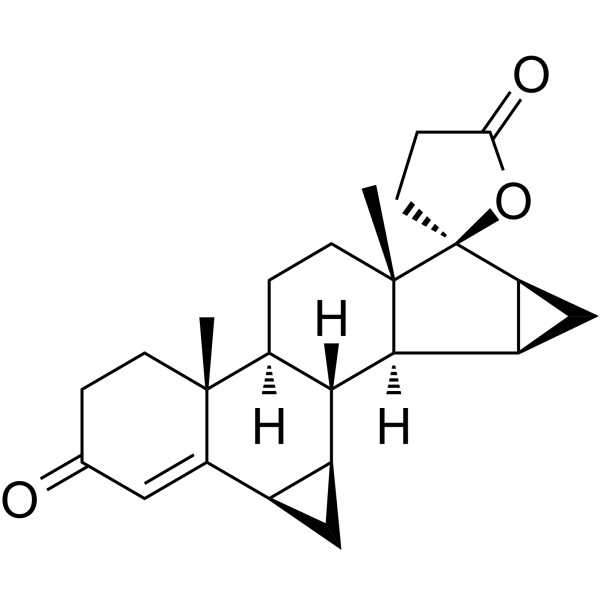
- HY-103245
-
|
|
Androgen Receptor
|
Cancer
|
|
Cl-4AS-1, a potent steroidal androgen receptor (AR) agonist (IC50 = 12 nM), is also an inhibitor of 5α-reductase types I and II (IC50 = 6 and 10 nM, respectively) .
|
-
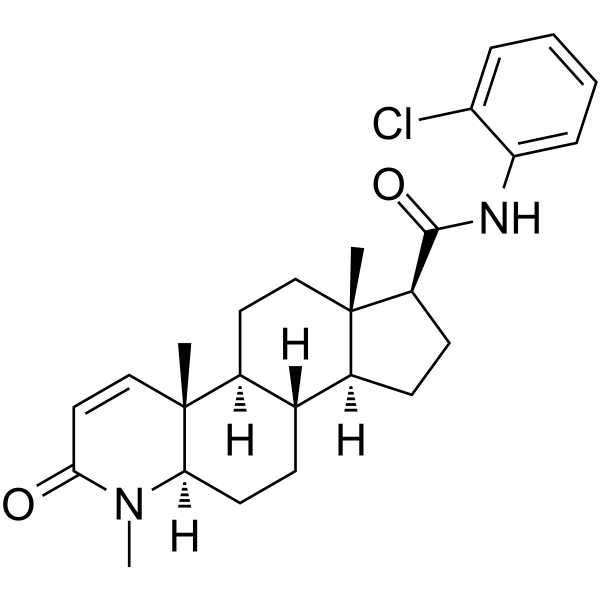
- HY-16985R
-
|
|
Androgen Receptor
|
Cancer
|
|
Darolutamide (Standard) is the analytical standard of Darolutamide. This product is intended for research and analytical applications. Darolutamide (ODM-201;BAY-1841788) is a potent androgen receptor (AR) antagonist with an IC50 of 26 nM in in vitro assay.
|
-

- HY-70002R
-
|
|
Androgen Receptor
Autophagy
|
Cancer
|
|
Enzalutamide (Standard) is the analytical standard of Enzalutamide. This product is intended for research and analytical applications. Enzalutamide (MDV3100) is an androgen receptor (AR) antagonist with an IC50 of 36 nM in LNCaP prostate cells. Enzalutamide is an autophagy activator .
|
-

- HY-B0845
-
-
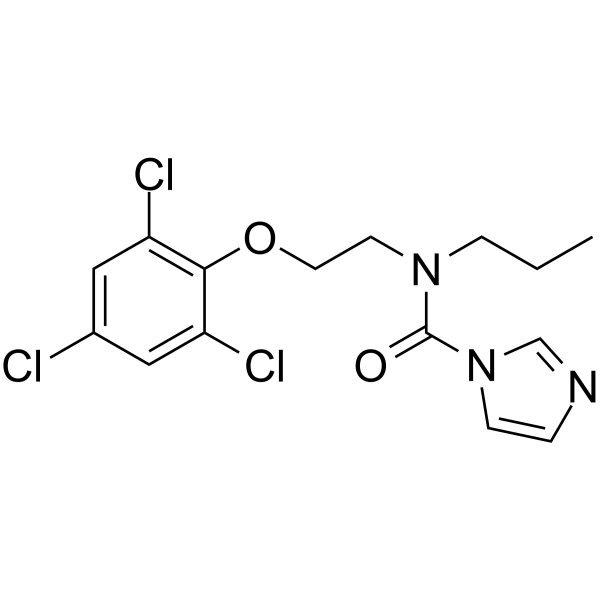
- HY-111372A
-
|
(Rac)-BAY 94-8862
|
Mineralocorticoid Receptor
|
Cardiovascular Disease
|
|
(Rac)-Finerenone ((Rac)-BAY 94-8862) is the racemate of Finerenone. Finerenone is a third-generation, selective, and orally available nonsteroidal mineralocorticoid receptor (MR) antagonist (IC50=18 nM). Finerenone displays excellent selectivity versus glucocorticoid receptor (GR), androgen receptor (AR), and progesterone receptor (>500-fold) .
|
-
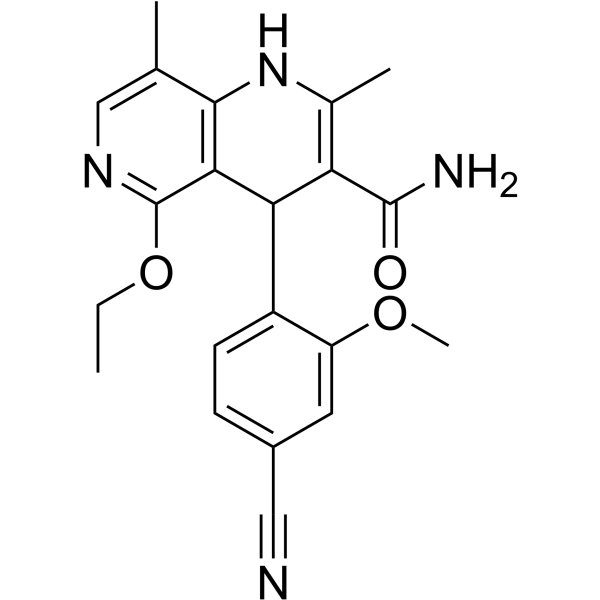
- HY-100186
-
|
|
Androgen Receptor
|
Cardiovascular Disease
Others
Metabolic Disease
Inflammation/Immunology
Endocrinology
Cancer
|
|
GSK-2881078 is an orally active and nonsteroidal selective androgen receptor modulator (SARM) which act as partial AR agonists in androgenic tissues while mainly as complete AR agonists in synthetic metabolic tissues,induces AR-mediated transcriptional activation in PC3(AR)2 cells (EC50 = 3.99 nM) and the effect can be inhibited by the non-steroidal AR antagonist Bicalutamide. GSK-2881078 can be used in research of muscle weakness and cachexia associated with both chronic and acute illness .
|
-
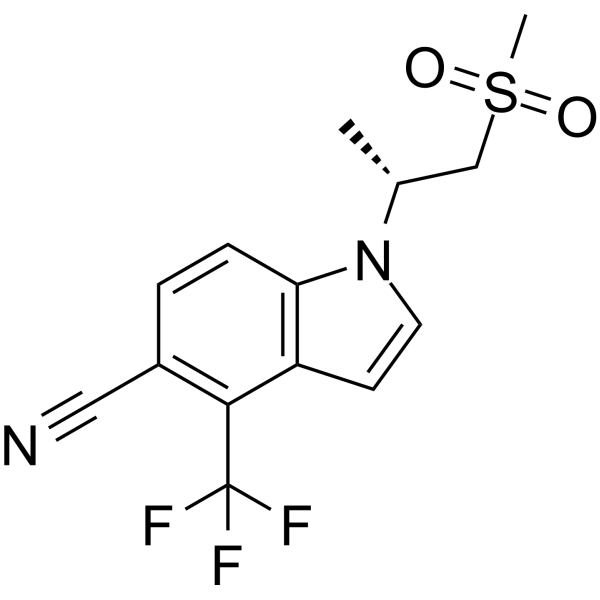
- HY-111145
-
|
|
Androgen Receptor
|
Cancer
|
|
RD162, a diarylthiohydantoin, is an orally active non-steroidal antiandrogen (NSAA). RD162 specifically binds to androgen receptor (AR). RD162 induces tumor regression in mouse models of castration-resistant human prostate cancer .
|
-
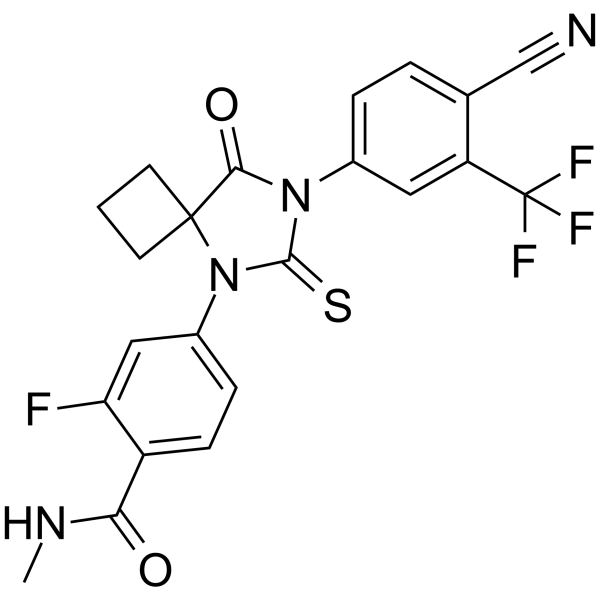
- HY-149914
-
|
|
Androgen Receptor
|
Cancer
|
|
WCA-814 is an androgen receptor (AR) antagonist-Hsp90 inhibitor conjugate. WCA-814 induces the degradation of full-length and AR-V7. WCA-814 has cytotoxic effect in prostatic cancer cells (IC50: 171.2 nM, 26.5 nM for LNCaP, 22Rv1 cell) .
|
-
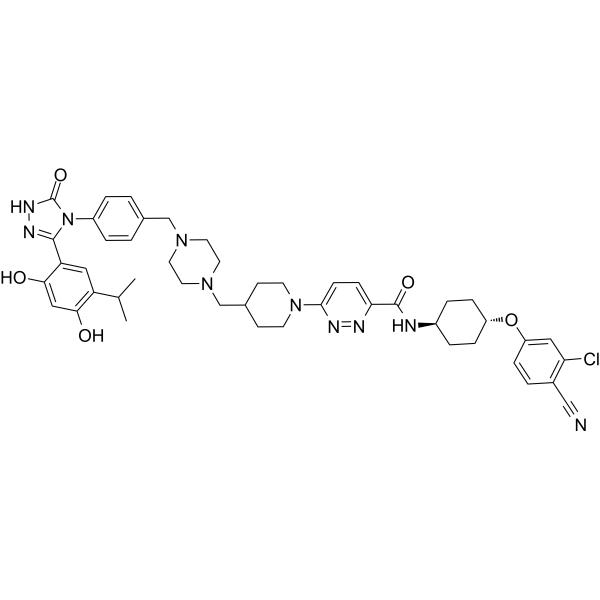
- HY-100348
-
|
|
Androgen Receptor
PPAR
Apoptosis
|
Cancer
|
|
EPI-001, a selective inhibitor of Androgen Receptor (AR), targets transactivation unit 5 (Tau-5) of the AR. EPI-001 can inhibit transactivation of the AR amino-terminal domain (NTD), with an IC50 of ~6 μM. EPI-001 is also a selective modulator of PPARγ. EPI-001 is active against castration-resistant prostate cancer .
|
-
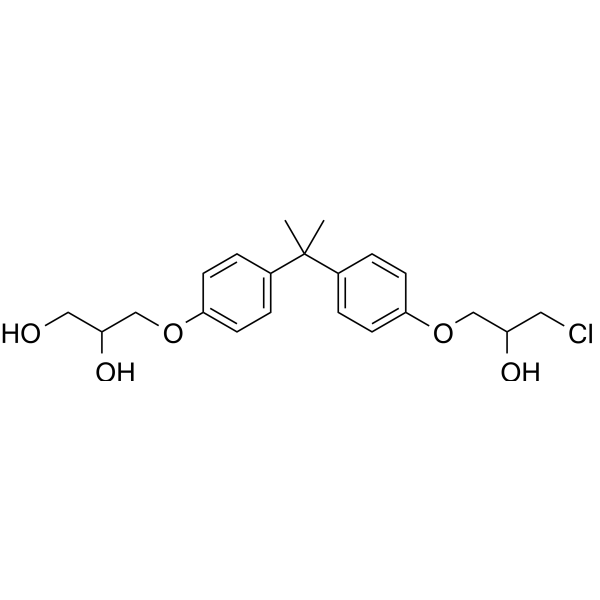
- HY-133045
-
|
|
Ligands for E3 Ligase
|
Cancer
|
|
VHL Ligand 8 is a VHL ligand. VHL Ligand 8 can be used to synthesize ARD-266 (HY-133020), a highly potent and VHL E3 ligase-based androgen receptor (AR) PROTAC degrader. ARD-266 effectively induces degradation of AR protein in AR-positive LNCaP, VCaP, and 22Rv1 prostate cancer cell lines with DC50 values of 0.2-1 nM .
|
-
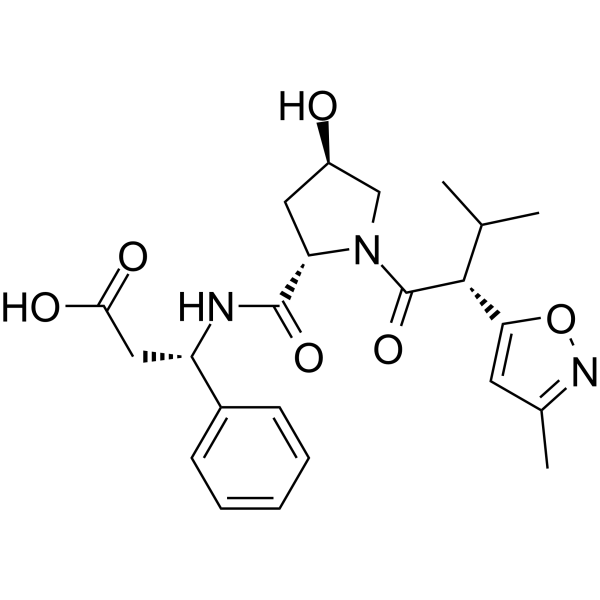
- HY-N7045
-
|
|
Androgen Receptor
Apoptosis
|
Cancer
|
|
Isosilybin B, a flavonolignan isolated from Silybum marianum, has anti-prostate cancer (PCA) activity via inhibiting proliferation and inducing G1 phase arrest and apoptosis. Isosilybin B causes androgen receptor (AR) degradation .
|
-
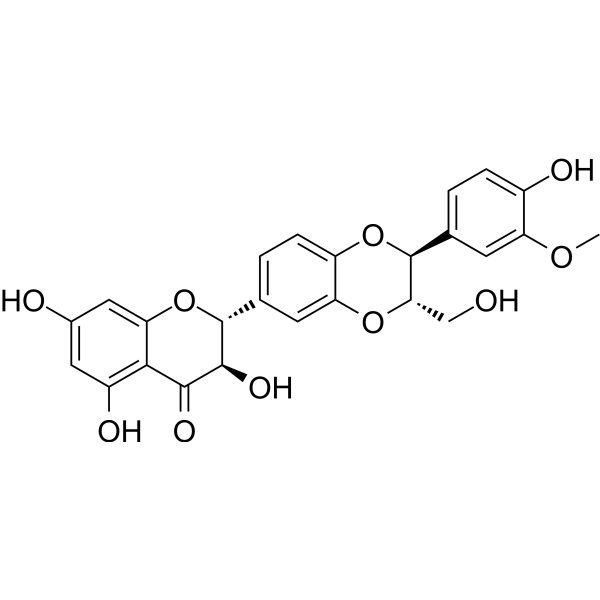
- HY-146397
-
|
|
PROTACs
Androgen Receptor
|
Cancer
|
|
TD-802 (Compound 33c) is an androgen receptor (AR) PROTAC degrader with good microsomal stability. TD-802 has good antitumor efficacy in vivo and can be used for metastatic castration-resistant prostate cancer research .
|
-
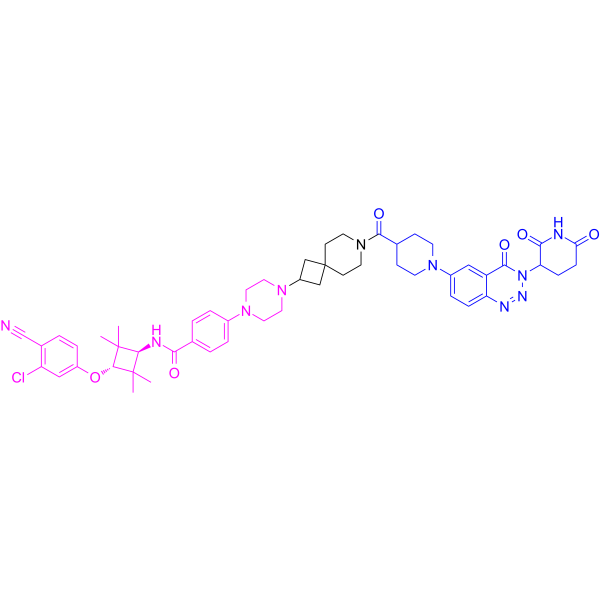
- HY-139659
-
|
|
PROTACs
Androgen Receptor
Progesterone Receptor
Apoptosis
|
Cancer
|
|
ARD-61 is a highly potent, effective and specific PROTAC androgen receptor (AR) degrader. ARD-61 potently and effectively induces AR and progesterone receptors (PR) degradation in AR+ cancer cell lines. ARD-61 induces apoptosis and effectively induces tumor growth inhibition in the MDA-MB-453 xenograft model in mice . ARD-61 is a click chemistry reagent, it contains an Alkyne group and can undergo copper-catalyzed azide-alkyne cycloaddition (CuAAc) with molecules containing Azide groups.
|
-
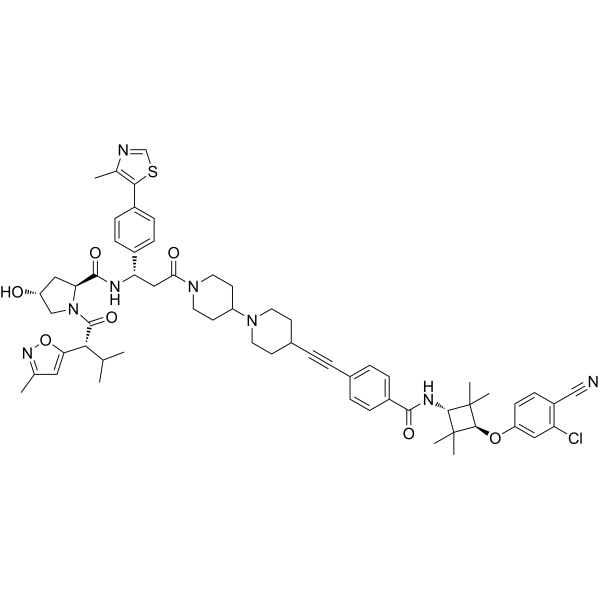
- HY-145479
-
|
|
PROTACs
Androgen Receptor
|
Cancer
|
|
PROTAC AR-V7 degrader-1 (Compound 6) is a potent, orally bioavailable and selective AR-V7 degrader with the DC50 of 0.32 µM by recruiting VHL E3 ligase to Androgen receptor (AR) DNA binding domain (DBD) binder. PROTAC AR-V7 degrader-1 exhibits activity against 22Rv1 cell-line expressing AR-V7 with the EC50 of 0.88 µM .
|
-
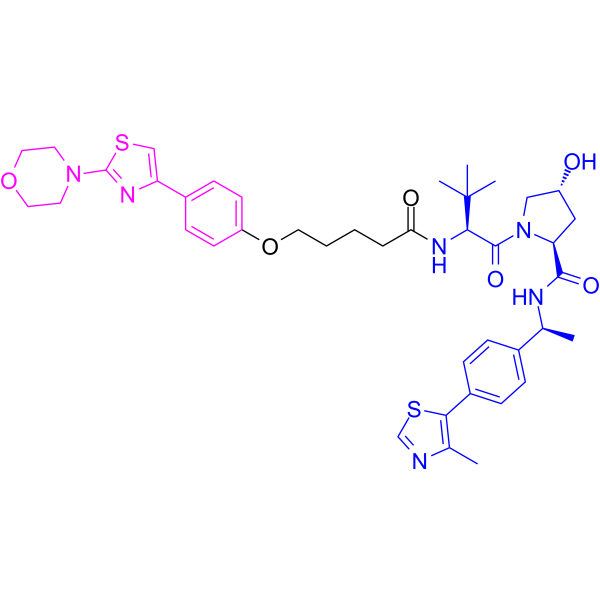
- HY-157491
-
-
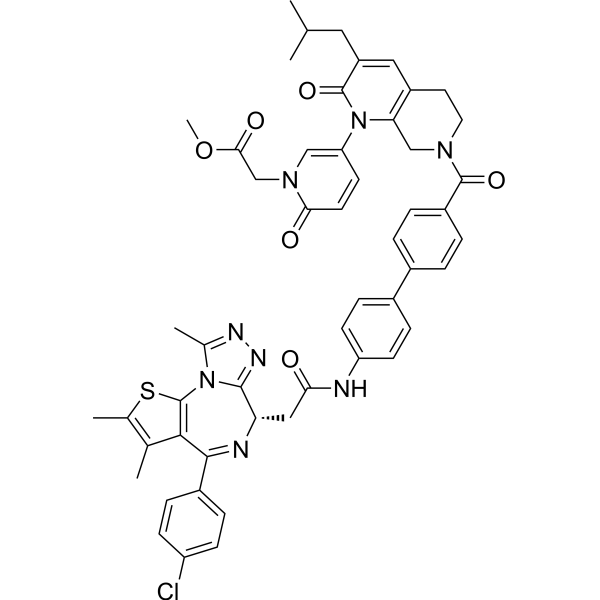
- HY-125065
-
|
|
Androgen Receptor
5 alpha Reductase
|
Endocrinology
Cancer
|
|
MK-4541 is an orally active and selective androgen receptor (AR) modulator. MK-4541 acts as an antagonist to inhibit 5α-reductase. MK-4541 inhibits proliferation and induces apoptosis in AR positive prostate cancer cells. MK-4541 significantly inhibited the growth of R3327-G prostate tumors in xenograft mouse model .
|
-
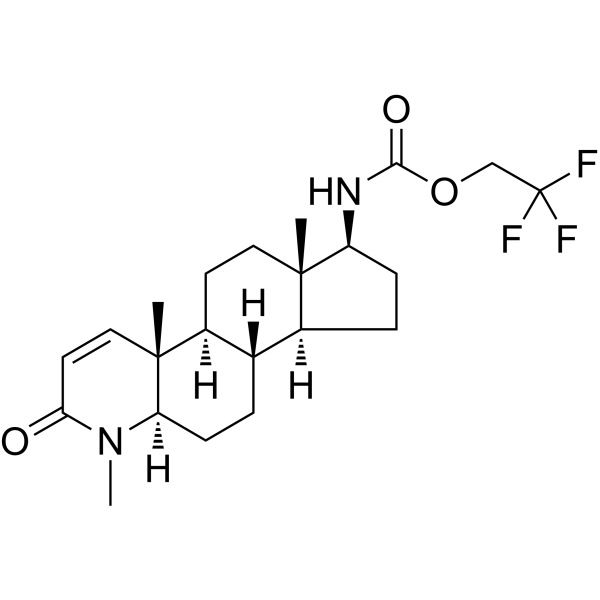
- HY-12023
-
GTx-007
2 Publications Verification
S-4
|
Androgen Receptor
|
Cancer
|
|
GTx-007 (S-4) is an orally active and selective nonsteroidal androgen receptor (AR) modulator (SARM) and a partial agonist, with Ki of 4 nM. GTx-007 (S-4) is identified as SARMs with potent and tissue-selective in vivo pharmacological activity .
|
-
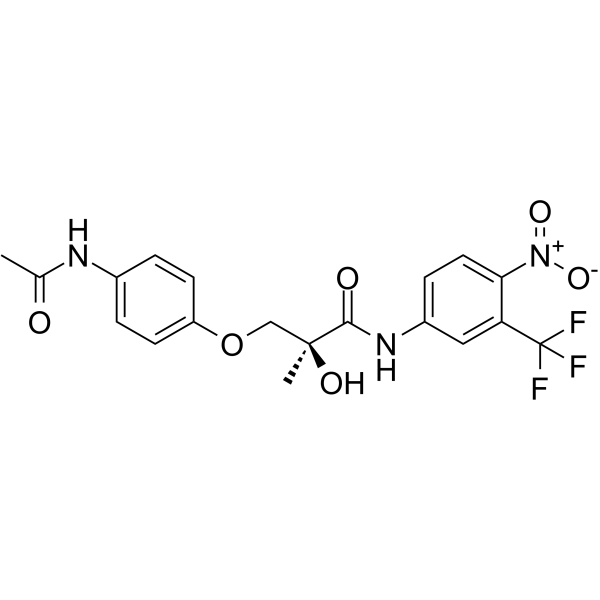
- HY-136242
-
|
|
Androgen Receptor
|
Endocrinology
Cancer
|
|
UT-34 is a potent, selective and orally active second-generation pan-androgen receptor (AR) antagonist and degrader with IC50s of 211.7 nM, 262.4 nM and 215.7 nM for wild-type, F876L and W741L AR, respectively. UT-34 binds to ligand-binding domain (LBD) and function-1 (AF-1) domains and requires ubiquitin proteasome pathway to degrade the AR. UT-34 has anti-prostate cancer efficacy .
|
-
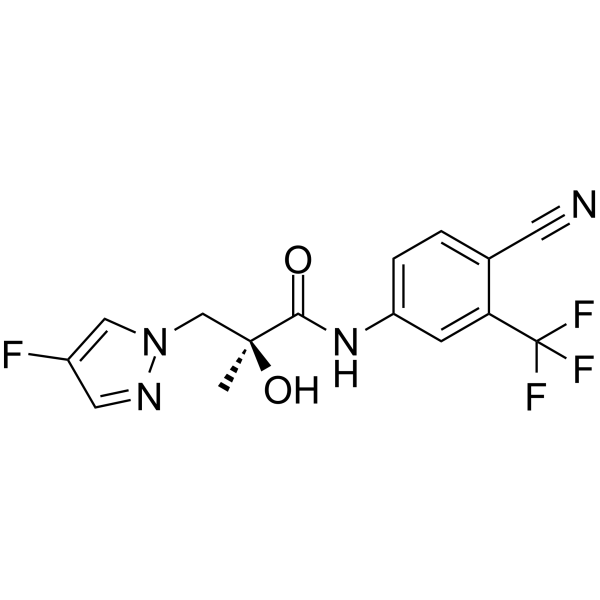
- HY-111372
-
|
BAY 94-8862
|
Mineralocorticoid Receptor
|
Cardiovascular Disease
|
|
Finerenone (BAY 94-8862) is a third-generation, selective, and orally available nonsteroidal mineralocorticoid receptor (MR) antagonist (IC50=18 nM). Finerenone displays excellent selectivity versus glucocorticoid receptor (GR), androgen receptor (AR), and progesterone receptor (>500-fold). Finerenone has the potential for cardiorenal diseases research, such as type 2 diabetes mellitus and chronic kidney disease .
|
-
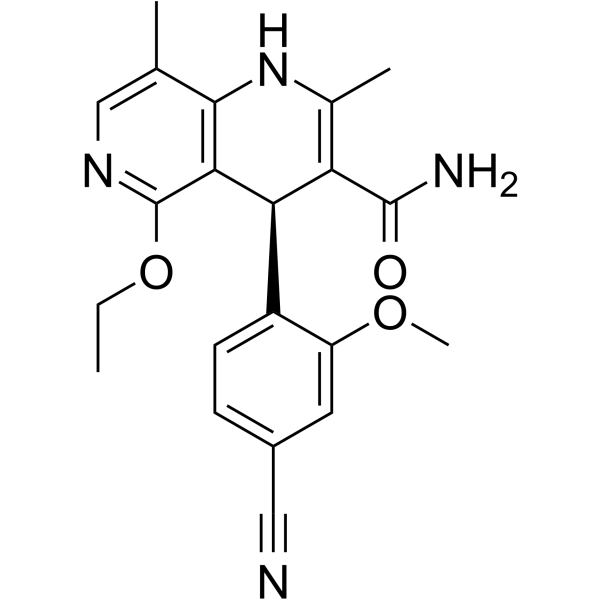
- HY-13613R
-
|
GG 745 (Standard); GI 198745 (Standard)
|
5 alpha Reductase
Apoptosis
|
Cancer
|
|
Dutasteride (Standard) is the analytical standard of Dutasteride. This product is intended for research and analytical applications. Dutasteride (GG745) is a potent inhibitor of both 5α-reductase isozymes. Dutasteride may possess off-target effects on the androgen receptor (AR) due to its structural similarity to DHT .
|
-
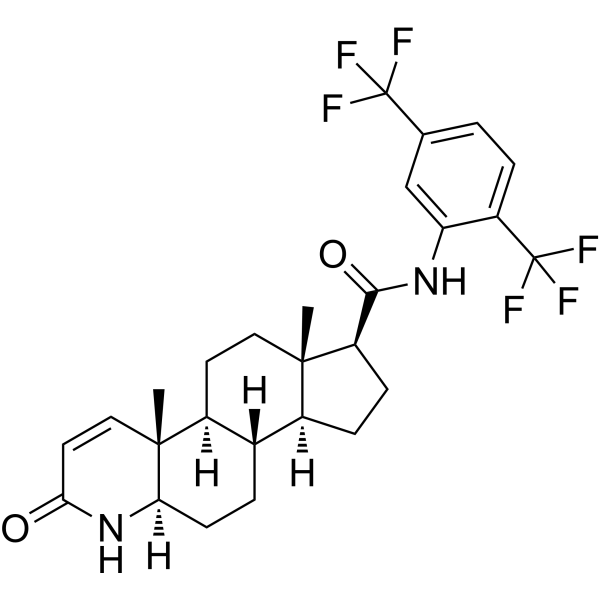
- HY-B0846
-
|
|
Fungal
Androgen Receptor
Parasite
|
Infection
|
|
Dimethomorph is a fungicide belongs to the fungicide group of sterol biosynthesis inhibitor. Dimethomorph can inhibit fungal cell wall formation. Dimethomorph also inhibits androgen receptor (AR) activity in MDA-kb2 cells with an IC20 of 0.263 µM .
|
-
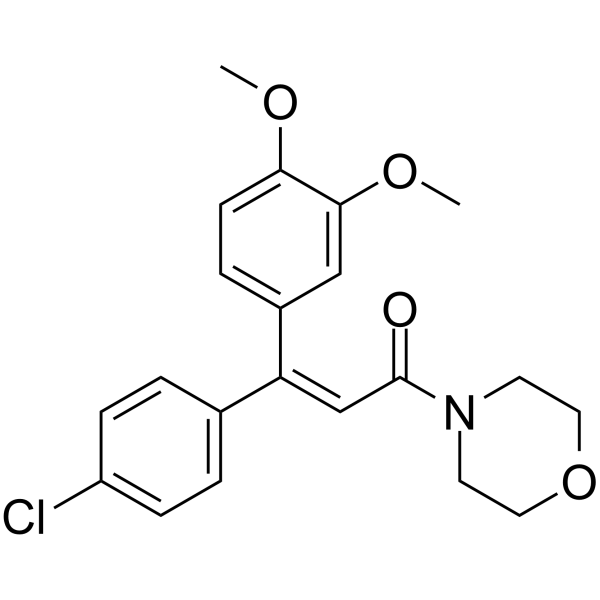
- HY-13613S
-
|
GG 745-13C6; GI 198745-13C6
|
Apoptosis
5 alpha Reductase
|
Cancer
|
|
Dutasteride- 13C6 is the 13C labeled Dutasteride[1]. Dutasteride (GG745) is a potent inhibitor of both 5α-reductase isozymes. Dutasteride may possess off-target effects on the androgen receptor (AR) due to its structural similarity to DHT[2].
|
-
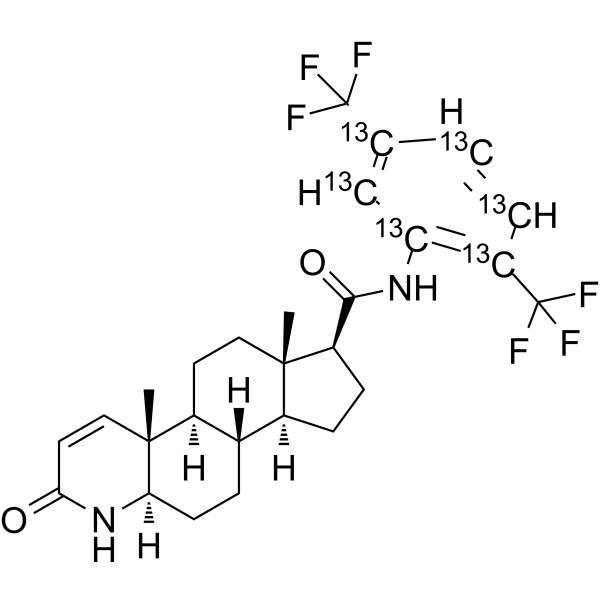
- HY-133020
-
|
|
PROTACs
Androgen Receptor
|
Cancer
|
|
ARD-266 is a highly potent and von Hippel-Lindau E3 ligase-based Androgen Receptor (AR) PROTAC degrader. ARD-266 effectively induces degradation of AR protein in AR-positive LNCaP, VCaP, and 22Rv1 prostate cancer cell lines with DC50 values of 0.2-1 nM . ARD-266 is a click chemistry reagent, it contains an Alkyne group and can undergo copper-catalyzed azide-alkyne cycloaddition (CuAAc) with molecules containing Azide groups.
|
-
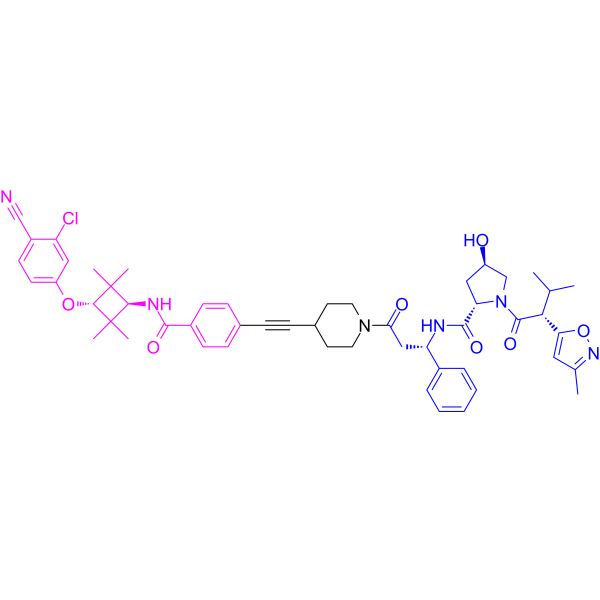
- HY-100348R
-
|
|
Androgen Receptor
PPAR
Apoptosis
|
Cancer
|
|
EPI-001 (Standard) is the analytical standard of EPI-001. This product is intended for research and analytical applications. EPI-001, a selective inhibitor of Androgen Receptor (AR), targets transactivation unit 5 (Tau-5) of the AR. EPI-001 can inhibit transactivation of the AR amino-terminal domain (NTD), with an IC50 of ~6 μM. EPI-001 is also a selective modulator of PPARγ. EPI-001 is active against castration-resistant prostate cancer .
|
-
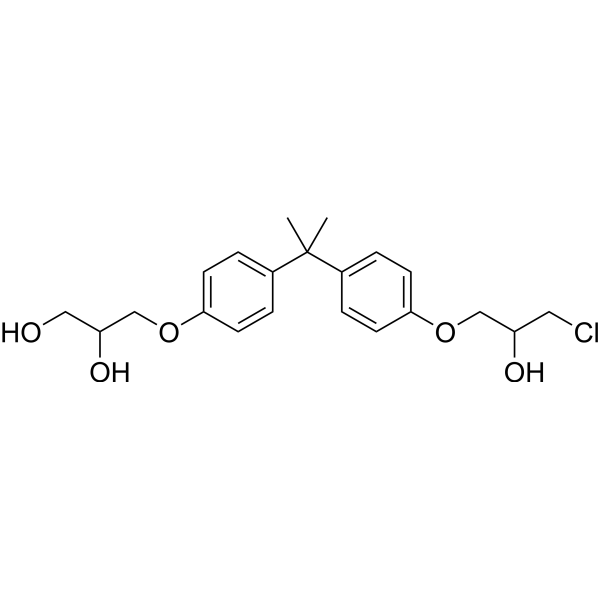
- HY-B1866
-
|
|
Androgen Receptor
|
Endocrinology
|
|
Linuron is a phenylurea herbicide that is widely used to control the growth of grass and weeds in various agriculture crops and in orchards. Linuron is a photosystem II inhibitor. Linuron is also a competitive androgen receptor (AR) antagonist with a Ki of 100 μM. Linuron shows reproductive toxicity in animals that acts as an endocrine disruptor .
|
-
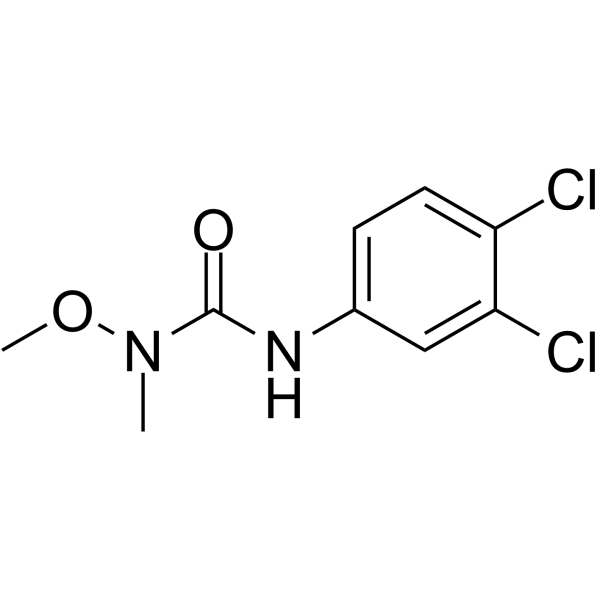
- HY-139970
-
|
|
Androgen Receptor
|
Endocrinology
Cancer
|
|
VPC-13789 is a potent, selective, and orally bioavailable antiandrogen. VPC-13789 can be used for the research of castration-resistant prostate cancer (CRPC) therapeutics. VPC-13789 inhibits androgen receptor (AR) transcriptional activity in LNCaP cells (IC50=0.19 μM) .
|
-
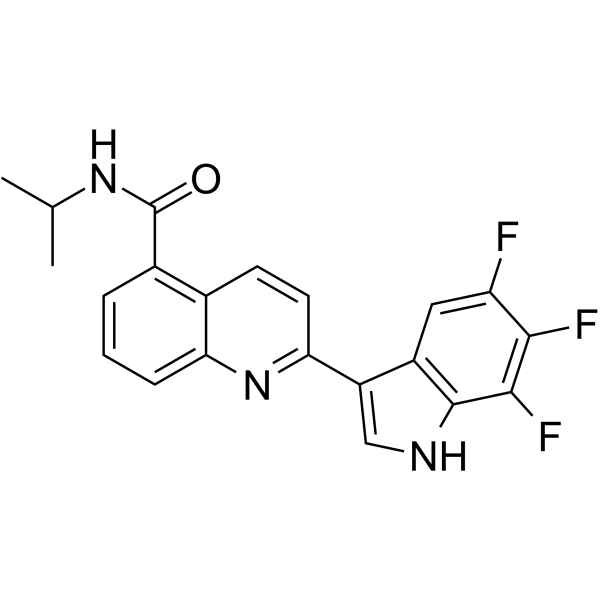
- HY-N7043
-
|
|
Apoptosis
|
Cancer
|
|
Isosilybin A, a flavonolignan isolated from silymarin, has anti-prostate cancer (PCA) activity. Isosilybin A inhibits proliferation and induces G1 phase arrest and apoptosis in cancer cells, which activates apoptotic machinery in PCA cells via targeting Akt-NF-κB-androgen receptor (AR) axis .
|
-
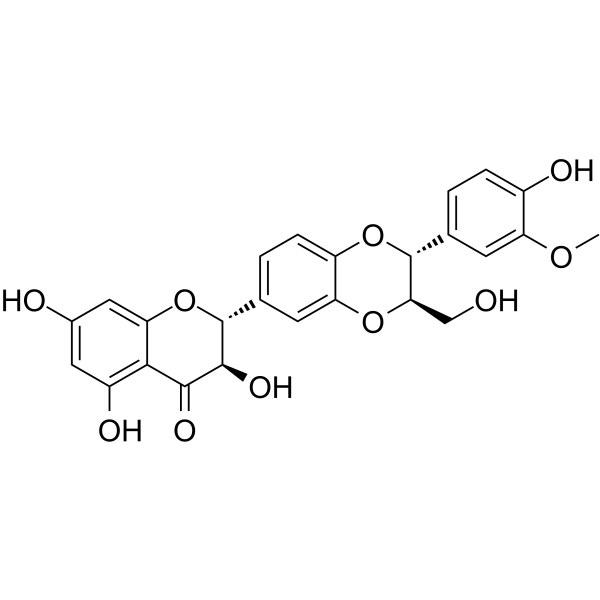
- HY-13613S2
-
|
GG 745-13C,15N,d; GI 198745-13C,15N,d
|
5 alpha Reductase
Apoptosis
Isotope-Labeled Compounds
|
Cancer
|
|
Dutasteride- 13C, 15N,d is 15N and deuterated labeled Dutasteride (HY-13613). Dutasteride (GG745) is a potent inhibitor of both 5α-reductase isozymes. Dutasteride may possess off-target effects on the androgen receptor (AR) due to its structural similarity to DHT .
|
-
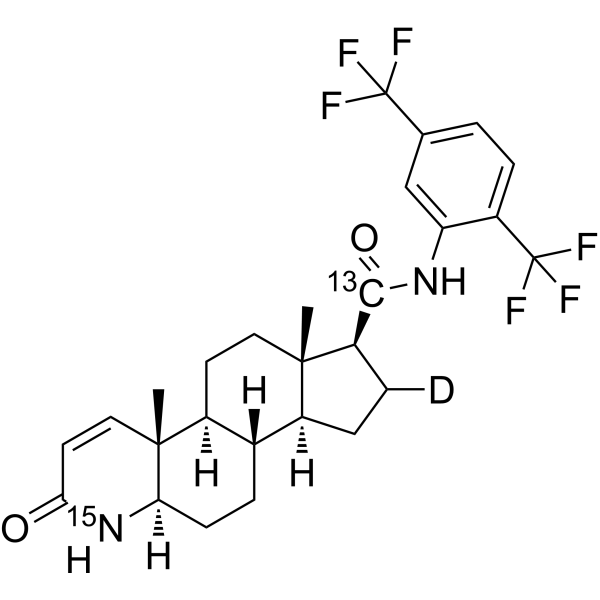
- HY-111372S
-
|
BAY 94-8862-d3
|
Mineralocorticoid Receptor
|
Others
|
|
Finerenone-d3 is the deuterium labeled finerenone (HY-111372). Finerenone is a third-generation, selective, and orally available nonsteroidal mineralocorticoid receptor (MR) antagonist (IC50=18 nM). Finerenone displays excellent selectivity versus glucocorticoid receptor (GR), androgen receptor (AR), and progesterone receptor (>500-fold). Finerenone has the potential for cardiorenal diseases research, such as type 2 diabetes mellitus and chronic kidney disease .
|
-
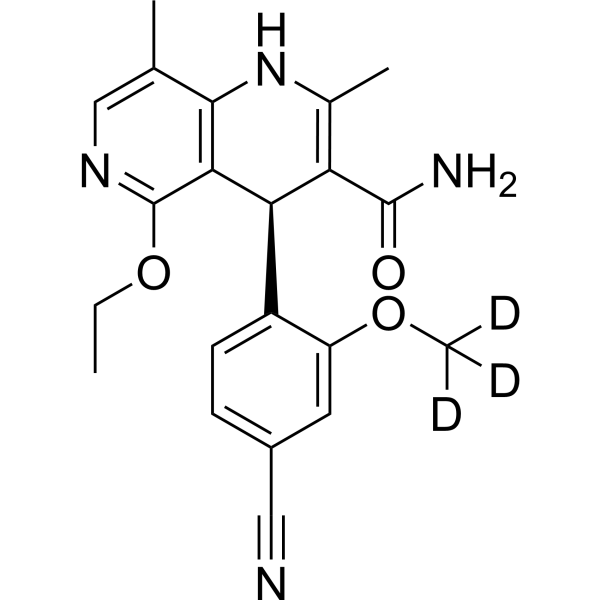
- HY-111372R
-
|
|
Mineralocorticoid Receptor
|
Cardiovascular Disease
|
|
Finerenone (Standard) is the analytical standard of Finerenone. This product is intended for research and analytical applications. Finerenone (BAY 94-8862) is a third-generation, selective, and orally available nonsteroidal mineralocorticoid receptor (MR) antagonist (IC50=18 nM). Finerenone displays excellent selectivity versus glucocorticoid receptor (GR), androgen receptor (AR), and progesterone receptor (>500-fold). Finerenone has the potential for cardiorenal diseases research, such as type 2 diabetes mellitus and chronic kidney disease .
|
-

- HY-147261
-
|
|
Histone Acetyltransferase
|
Cancer
|
|
B026 is a selective, potent, orally active p300/CBP histone acetyltransferase (HAT) inhibitor with IC50 values of 1.8 nM and 9.5 nM for p300 and CBP enzyme, respectively. B026 has anticancer activity for androgen receptor-positive (AR+) prostate cancer cell lines .
|
-
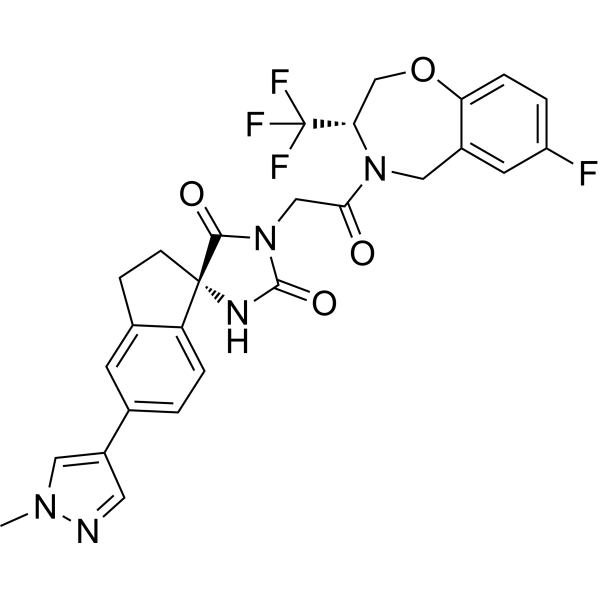
- HY-116214
-
|
|
Fungal
Androgen Receptor
|
Infection
Endocrinology
|
|
Cyprodinil is an anilinopyrimidine broad-spectrum fungicide that inhibits the biosynthesis of methionine in phytopathogenic fungi. Cyprodinil inhibits mycelial cell growth of B. cinerea, P. herpotrichoides, and H. oryzae on amino acid-free media (IC50s=0.44, 4.8, and 0.03 µM, respectively). Cyprodinil acts as an androgen receptor (AR) agonist (EC50=1.91 µM) in the absence of the AR agonist DHT and inhibits the androgenic effect of DHT (IC50=15.1 µM).
|
-
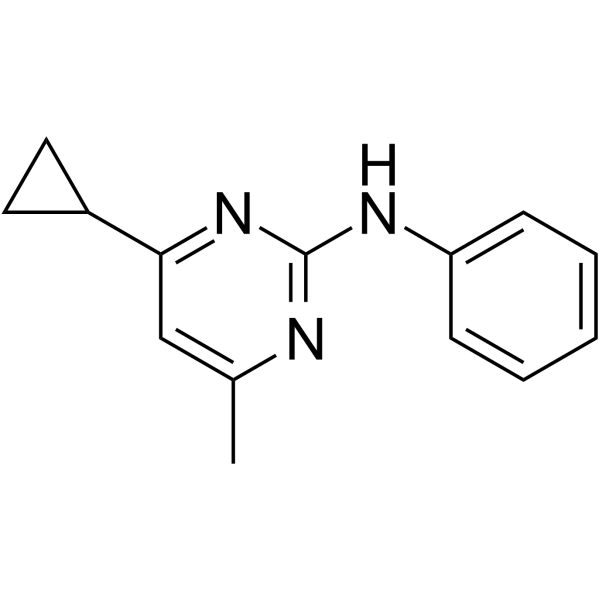
- HY-111024
-
|
PMC
|
Androgen Receptor
|
Cancer
|
|
2,2,5,7,8-Pentamethyl-6-Chromanol (PMC) is the anti-oxidant moiety of vitamin E (α-tocopherol). 2,2,5,7,8-Pentamethyl-6-Chromanol has potent androgen receptor (AR) signaling modulation and anti-cancer activity against prostate cancer cell lines .
|
-
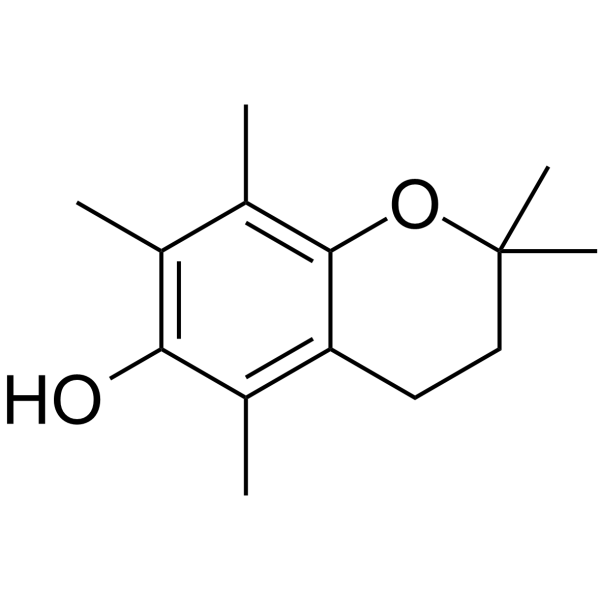
- HY-B0846S
-
|
|
Fungal
Androgen Receptor
Parasite
|
Infection
|
|
Dimethomorph-d8 is the deuterium labeled Dimethomorph[1]. Dimethomorph is a fungicide belongs to the fungicide group of sterol biosynthesis inhibitor. Dimethomorph can inhibit fungal cell wall formation. Dimethomorph also inhibits androgen receptor (AR) activity in MDA-kb2 cells with an IC20 of 0.263 μM[2][3][4].
|
-
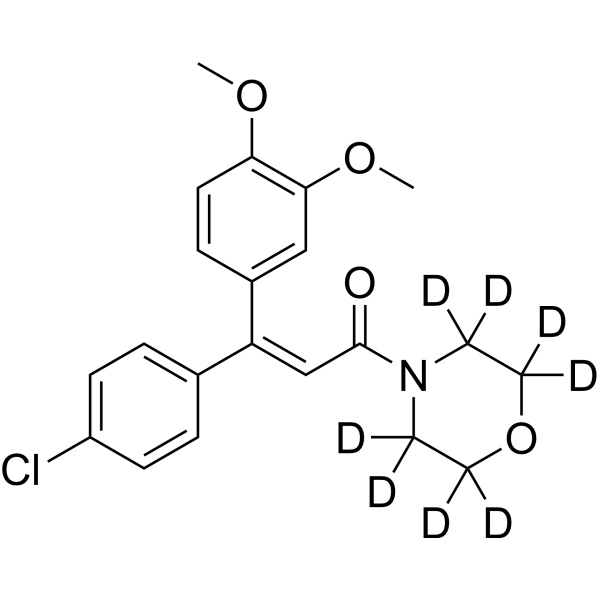
- HY-N2908
-
|
Methyl atrarate
|
Androgen Receptor
NO Synthase
p38 MAPK
NF-κB
|
Inflammation/Immunology
Cancer
|
|
Atraric acid (Methyl atrarate) is a specific androgen receptor (AR) antagonist with anti-inflammatory and anticancer effects. Atraric acid represses the expression of the endogenous prostate specific antigen gene in both LNCaP and C4-2 cells. Atraric acid can also inhibit the synthesis of NO and cytokine, and suppress the MAPK-NFκB signaling pathway. Atraric acid can be used to research prostate diseases and inflammatory diseases .
|
-
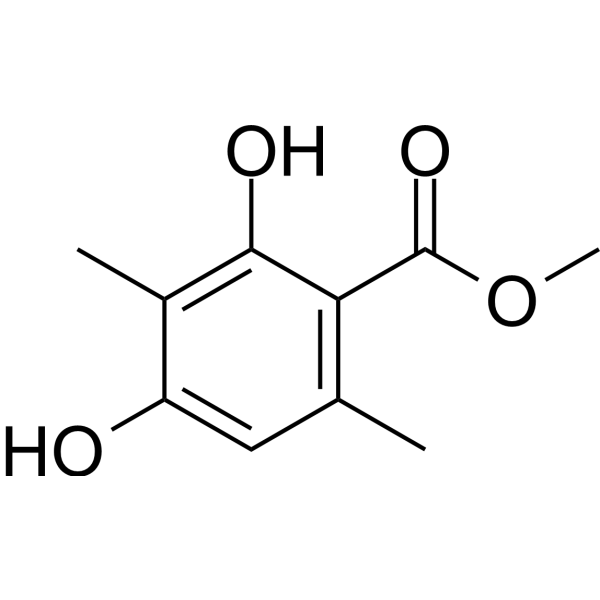
- HY-116214S1
-
|
|
Isotope-Labeled Compounds
Fungal
Androgen Receptor
|
Infection
Endocrinology
|
|
Cyprodinil- 13C6 is the 13C6 labeled Cyprodinil. Cyprodinil is an anilinopyrimidine broad-spectrum fungicide that inhibits the biosynthesis of methionine in phytopathogenic fungi. Cyprodinil inhibits mycelial cell growth of B. cinerea, P. herpotrichoides, and H. oryzae on amino acid-free media (IC50s=0.44, 4.8, and 0.03 µM, respectively). Cyprodinil acts as an androgen receptor (AR) agonist (EC50=1.91 µM) in the absence of the AR agonist DHT and inhibits the androgenic effect of DHT (IC50=15.1 µM).
|
-
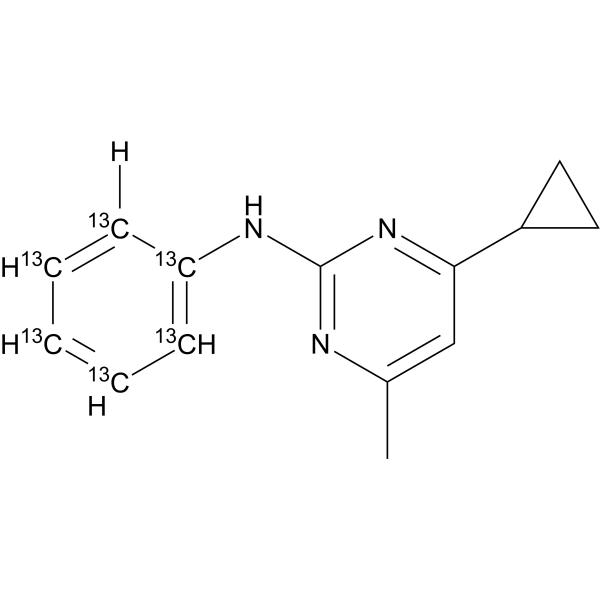
- HY-116214R
-
|
|
Fungal
Androgen Receptor
|
Infection
Endocrinology
|
|
Cyprodinil (Standard) is the analytical standard of Cyprodinil. This product is intended for research and analytical applications. Cyprodinil is an anilinopyrimidine broad-spectrum fungicide that inhibits the biosynthesis of methionine in phytopathogenic fungi. Cyprodinil inhibits mycelial cell growth of B. cinerea, P. herpotrichoides, and H. oryzae on amino acid-free media (IC50s=0.44, 4.8, and 0.03 µM, respectively). Cyprodinil acts as an androgen receptor (AR) agonist (EC50=1.91 µM) in the absence of the AR agonist DHT and inhibits the androgenic effect of DHT (IC50=15.1 µM).
|
-
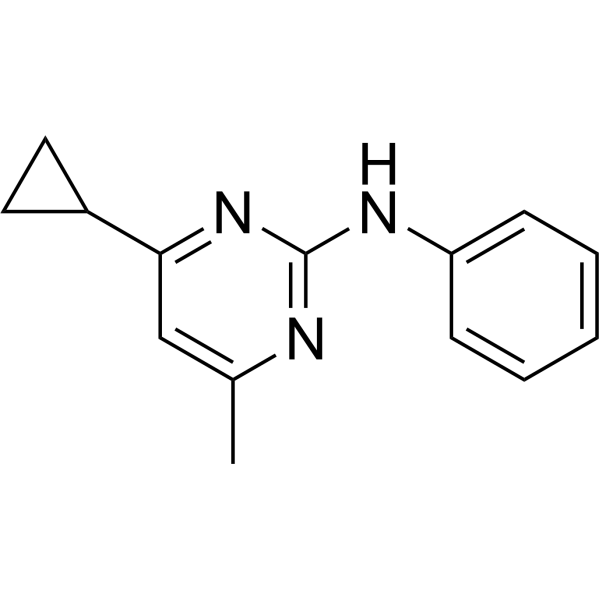
- HY-133044
-
|
|
PROTAC Linkers
|
Cancer
|
|
Boc-Pip-alkyne-Ph-COOH is a PROTAC linker, which refers to the alkyl/ether composition. Boc-Pip-alkyne-Ph-COOH can be used in the synthesis of a series of PROTACs, such as ARD-266 (HY-133020). ARD-266 effectively induces degradation of androgen receptor (AR) protein in AR-positive LNCaP, VCaP, and 22Rv1 prostate cancer cell lines with DC50 values of 0.2-1 nM . Boc-Pip-alkyne-Ph-COOH is a click chemistry reagent, it contains an Alkyne group and can undergo copper-catalyzed azide-alkyne cycloaddition (CuAAc) with molecules containing Azide groups.
|
-
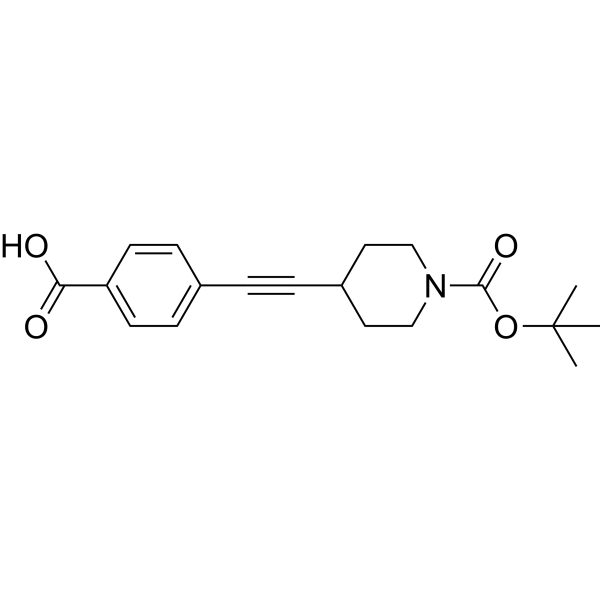
- HY-116214S
-
|
|
Isotope-Labeled Compounds
|
Others
|
|
Cyprodinil-d5is the deuterium labeledCyprodinil(HY-116214) . Cyprodinil is an anilinopyrimidine broad-spectrum fungicide that inhibits the biosynthesis of methionine in phytopathogenic fungi. Cyprodinil inhibits mycelial cell growth of B. cinerea, P. herpotrichoides, and H. oryzae on amino acid-free media (IC50s=0.44, 4.8, and 0.03 μM, respectively). Cyprodinil acts as an androgen receptor (AR) agonist (EC50=1.91 μM) in the absence of the AR agonist DHT and inhibits the androgenic effect of DHT (IC50=15.1 μM) .
|
-
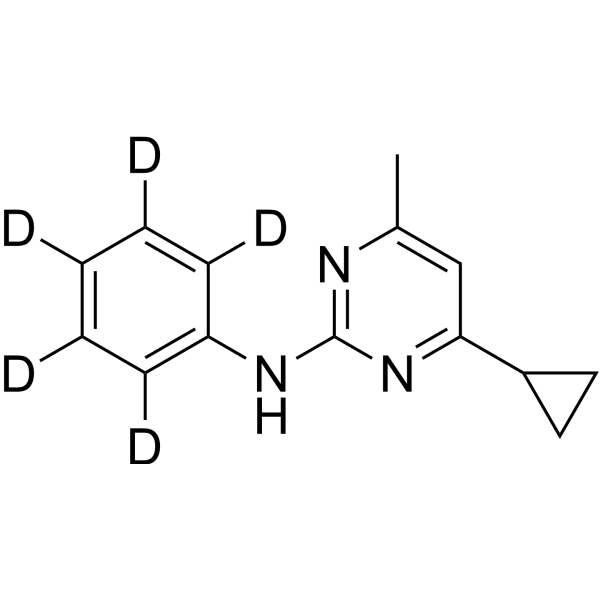
- HY-111784
-
|
CCS1477
|
Epigenetic Reader Domain
|
Cancer
|
|
Inobrodib (CCS1477) is an orally active, potent, and selective inhibitor of the p300/CBP bromodomain. Inobrodib binds to p300 and CBP with Kd values of 1.3 and 1.7 nM, respectively, and with 170/130-fold selectivity compared with BRD4 with a Kd of 222 nM. CCS1477 inhibits cell proliferation in prostate cancer cell lines and decreases androgen receptor (AR)- and C-MYC-regulated gene expression .
|
-
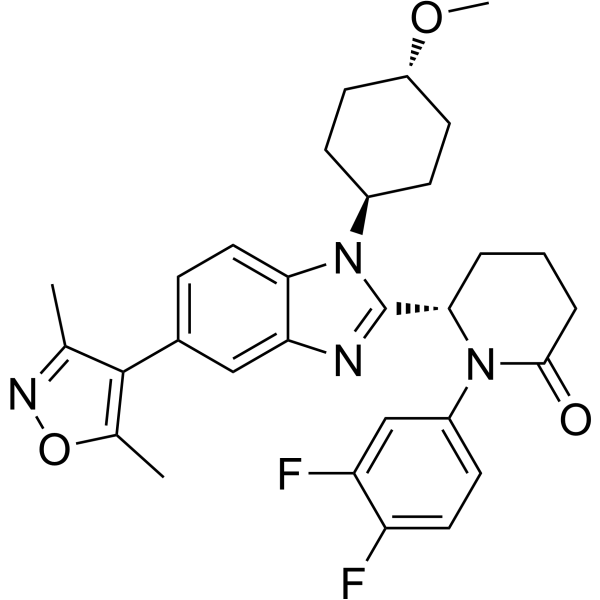
- HY-160777
-
|
Galeterone 3β-imidazole
|
Androgen Receptor
MNK
|
Cancer
|
|
VNPP433-3β is a molecular glue degrader, which degrades androgen receptor (AR) and its splice variants (AR-Vs) and MAP kinase-interacting serine/threonine protein kinase Mnk1/2. VNPP433-3β inhibits proliferation of cancer cell LNCaP, C4-2B and CWR22Rv1 with GI50 of 0.2, 0.3 and 0.31 μM. VNPP433-3β exhibits good pharmacokinetic characters in CD-1 mouse and inhibits tumor growth in the CWR22Rv1 xenograft mouse model .
|
-

- HY-133046
-
|
|
E3 Ligase Ligand-Linker Conjugates
|
Cancer
|
|
VHL Ligand-Linker Conjugates 17 incorporates a VHL ligand for the E3 ubiquitin ligase, and a PROTAC linker. VHL Ligand-Linker Conjugates 17 can be used in the synthesis of a series of PROTACs, such as ARD-266 (HY-133020). ARD-266 is a highly potent androgen receptor (AR) PROTAC degrader . VHL Ligand-Linker Conjugates 17 is a click chemistry reagent, it contains an Alkyne group and can undergo copper-catalyzed azide-alkyne cycloaddition (CuAAc) with molecules containing Azide groups.
|
-
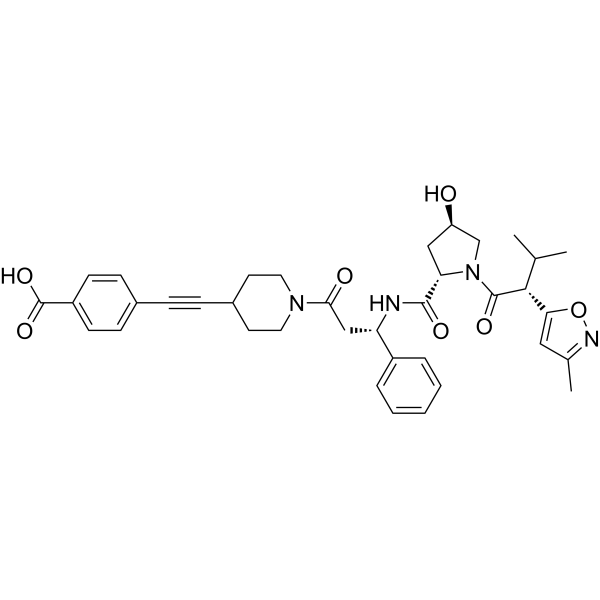
- HY-161369
-
|
|
PROTACs
Histone Acetyltransferase
|
Cancer
|
|
CBPD-268 is a potent and orally active CBP/p300 PROTAC degrader with an DC50 value of ≤ 0.03 nM. CBPD-268 induces CBP/p300 degradation and inhibits cell growth. CBPD-268 shows antitumor activity. CBPD-268 has the potential for the research of AR-positive prostate cancer (Srtucture Note: Red, Androgen receptor degrader (HY-W248665A); Blue, CBP/p300 ligand (HY-161483); Black, Linker) .
|
-
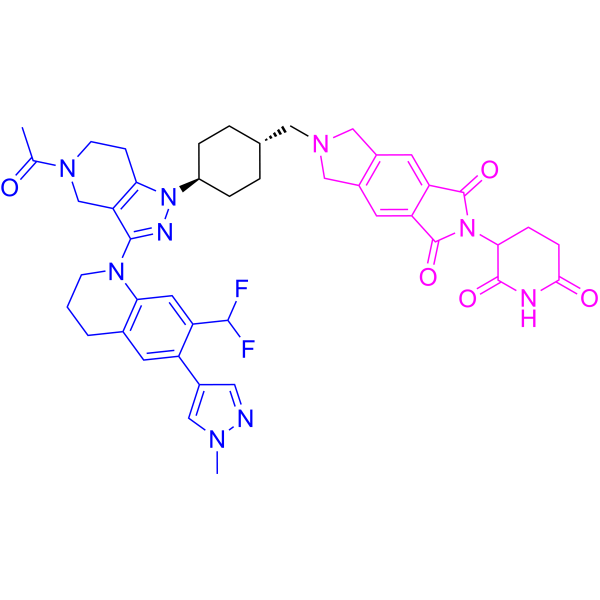
- HY-N8504
-
|
NSC 260179; Spectinabilin
|
Bacterial
|
Infection
|
|
Neoaureothin is a bacterial metabolite that has been found in Streptomyces. It is an androgen receptor (AR) antagonist that inhibits binding of dihydrotestosterone (DHT) to ARs (IC50=13 μM) and inhibits DHT-induced expression of prostate-specific antigen in LNCaP cells (IC50=1.75 nM). Neoaureothin is cytotoxic to A549, HCT116, and HepG2 cells (IC50s=34.3, 47, and 37.2 μg/mL, respectively). It also has nematocidal activity against the pine wood nematode B. xylophilus (LC50=0.84 μg/mL) and increases survival of P. densiflora trees inoculated with B. xylophilus.
|
-

| Cat. No. |
Product Name |
Category |
Target |
Chemical Structure |
| Cat. No. |
Product Name |
Chemical Structure |
-
- HY-16060S
-
|
|
|
Apalutamide-d4 is a deuterium labeled Apalutamide. Apalutamide is a potent and competitive androgen receptor (AR) antagonist, binding AR with an IC50 of 16 nM[1].
|
-

-
- HY-70002S1
-
|
|
|
Enzalutamide-d6 is a deuterium labeled Enzalutamide (MDV3100). Enzalutamide is an androgen receptor (AR) antagonist with an IC50 of 36 nM in LNCaP prostate cells[1].
|
-

-
- HY-16060S3
-
|
|
|
Apalutamide-d7 is deuterated labeled Apalutamide (HY-16060). Apalutamide (ARN-509) is a potent and competitive androgen receptor (AR) antagonist, binding AR with an IC50 of 16 nM .
|
-

-
- HY-16060S1
-
|
|
|
Apalutamide-d3 is the deuterium labeled Apalutamide[1]. Apalutamide (ARN-509) is a potent and competitive androgen receptor (AR) antagonist, binding AR with an IC50 of 16 nM[2].
|
-

-
- HY-16060S2
-
|
|
|
Apalutamide- 13C,d3 is the 13C- and deuterium labeled Apalutamide. Apalutamide (ARN-509) is a potent and competitive androgen receptor (AR) antagonist, binding AR with an IC50 of 16 nM[1].
|
-

-
- HY-70002S
-
|
|
|
Deutenzalutamide (Enzalutamide-d3) is a developed deuterium labeled Enzalutamide (MDV3100). Enzalutamide is an androgen receptor (AR) antagonist with an IC50 of 36 nM in LNCaP prostate cells .
|
-

-
- HY-14249S
-
|
|
|
Bicalutamide-d4 is the deuterium labeled Bicalutamide. Bicalutamide is an orally active non-steroidal androgen receptor (AR) antagonist. Bicalutamide can be used for the research of prostate cancer[1].
|
-

-
- HY-135794S
-
|
|
|
11-Ketodihydrotestosterone-d3 is the deuterium labeled 11-Ketodihydrotestosterone. 11-Ketodihydrotestosterone (11-KDHT; 5α-Dihydro-11-keto testosterone) is an endogenous steroid and a metabolite of 11β-Hydroxyandrostenedione. 11-Ketodihydrotestosterone is an active androgen and is also a potent androgen receptor (AR) agonist with a Ki of 20.4 nM and an EC50 of 1.35 nM for human AR. 11-Ketodihydrotestosterone drives gene regulation, protein expression and cell growth in androgen-dependent prostate cancer cells[1][2].
|
-

-
- HY-14249S1
-
|
|
|
Bicalutamide-d5 is deuterated labeled Bicalutamide (HY-14249). Bicalutamide is an orally active non-steroidal androgen receptor (AR) antagonist. Bicalutamide can be used for the research of prostate cancer .
|
-

-
- HY-13613S
-
|
|
|
Dutasteride- 13C6 is the 13C labeled Dutasteride[1]. Dutasteride (GG745) is a potent inhibitor of both 5α-reductase isozymes. Dutasteride may possess off-target effects on the androgen receptor (AR) due to its structural similarity to DHT[2].
|
-

-
- HY-13613S2
-
|
|
|
Dutasteride- 13C, 15N,d is 15N and deuterated labeled Dutasteride (HY-13613). Dutasteride (GG745) is a potent inhibitor of both 5α-reductase isozymes. Dutasteride may possess off-target effects on the androgen receptor (AR) due to its structural similarity to DHT .
|
-

-
- HY-111372S
-
|
|
|
Finerenone-d3 is the deuterium labeled finerenone (HY-111372). Finerenone is a third-generation, selective, and orally available nonsteroidal mineralocorticoid receptor (MR) antagonist (IC50=18 nM). Finerenone displays excellent selectivity versus glucocorticoid receptor (GR), androgen receptor (AR), and progesterone receptor (>500-fold). Finerenone has the potential for cardiorenal diseases research, such as type 2 diabetes mellitus and chronic kidney disease .
|
-

-
- HY-B0846S
-
|
|
|
Dimethomorph-d8 is the deuterium labeled Dimethomorph[1]. Dimethomorph is a fungicide belongs to the fungicide group of sterol biosynthesis inhibitor. Dimethomorph can inhibit fungal cell wall formation. Dimethomorph also inhibits androgen receptor (AR) activity in MDA-kb2 cells with an IC20 of 0.263 μM[2][3][4].
|
-

-
- HY-116214S1
-
|
|
|
Cyprodinil- 13C6 is the 13C6 labeled Cyprodinil. Cyprodinil is an anilinopyrimidine broad-spectrum fungicide that inhibits the biosynthesis of methionine in phytopathogenic fungi. Cyprodinil inhibits mycelial cell growth of B. cinerea, P. herpotrichoides, and H. oryzae on amino acid-free media (IC50s=0.44, 4.8, and 0.03 µM, respectively). Cyprodinil acts as an androgen receptor (AR) agonist (EC50=1.91 µM) in the absence of the AR agonist DHT and inhibits the androgenic effect of DHT (IC50=15.1 µM).
|
-

-
- HY-116214S
-
|
|
|
Cyprodinil-d5is the deuterium labeledCyprodinil(HY-116214) . Cyprodinil is an anilinopyrimidine broad-spectrum fungicide that inhibits the biosynthesis of methionine in phytopathogenic fungi. Cyprodinil inhibits mycelial cell growth of B. cinerea, P. herpotrichoides, and H. oryzae on amino acid-free media (IC50s=0.44, 4.8, and 0.03 μM, respectively). Cyprodinil acts as an androgen receptor (AR) agonist (EC50=1.91 μM) in the absence of the AR agonist DHT and inhibits the androgenic effect of DHT (IC50=15.1 μM) .
|
-

Your information is safe with us. * Required Fields.
Inquiry Information
- Product Name:
- Cat. No.:
- Quantity:
- MCE Japan Authorized Agent:















































































































































